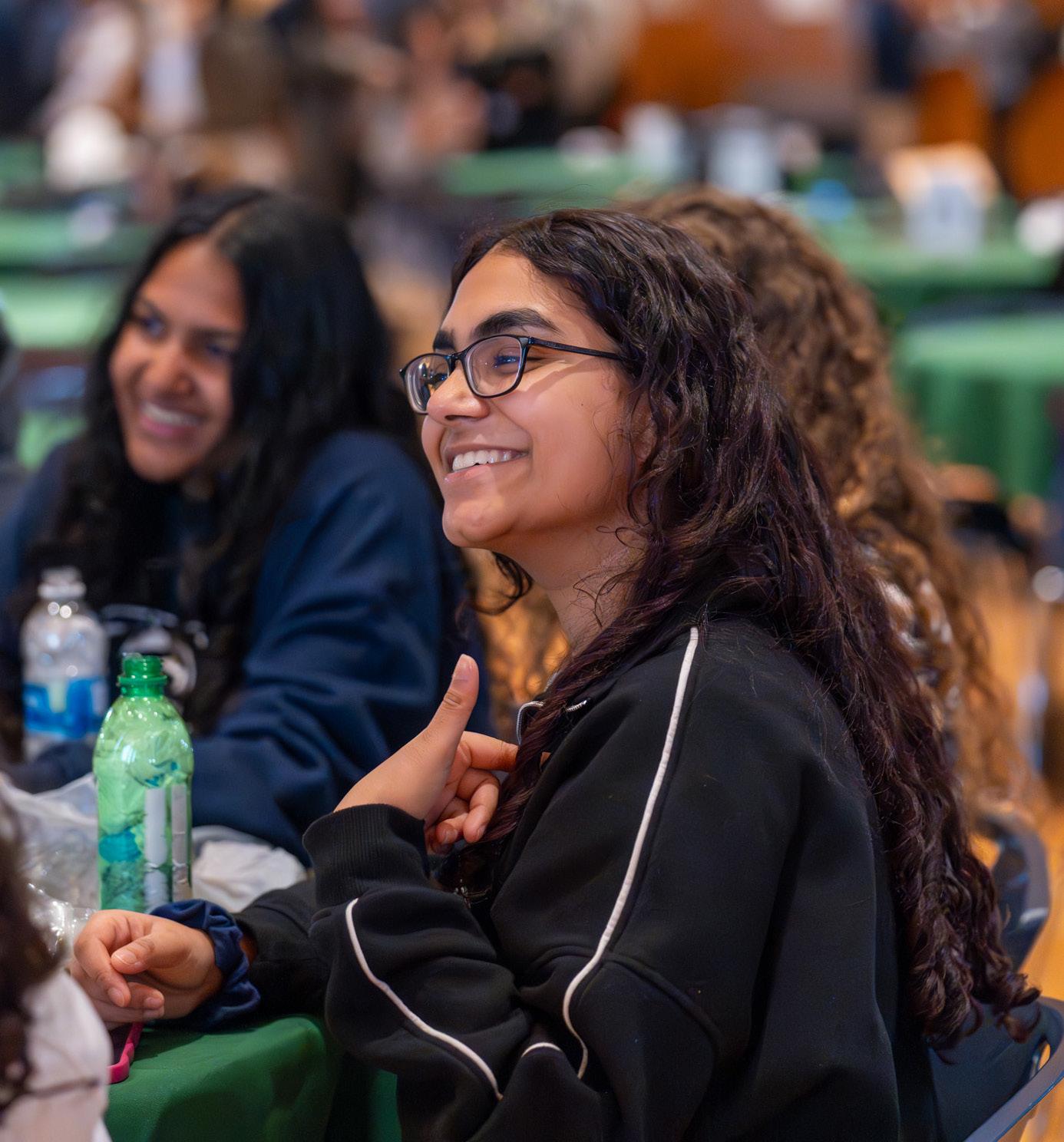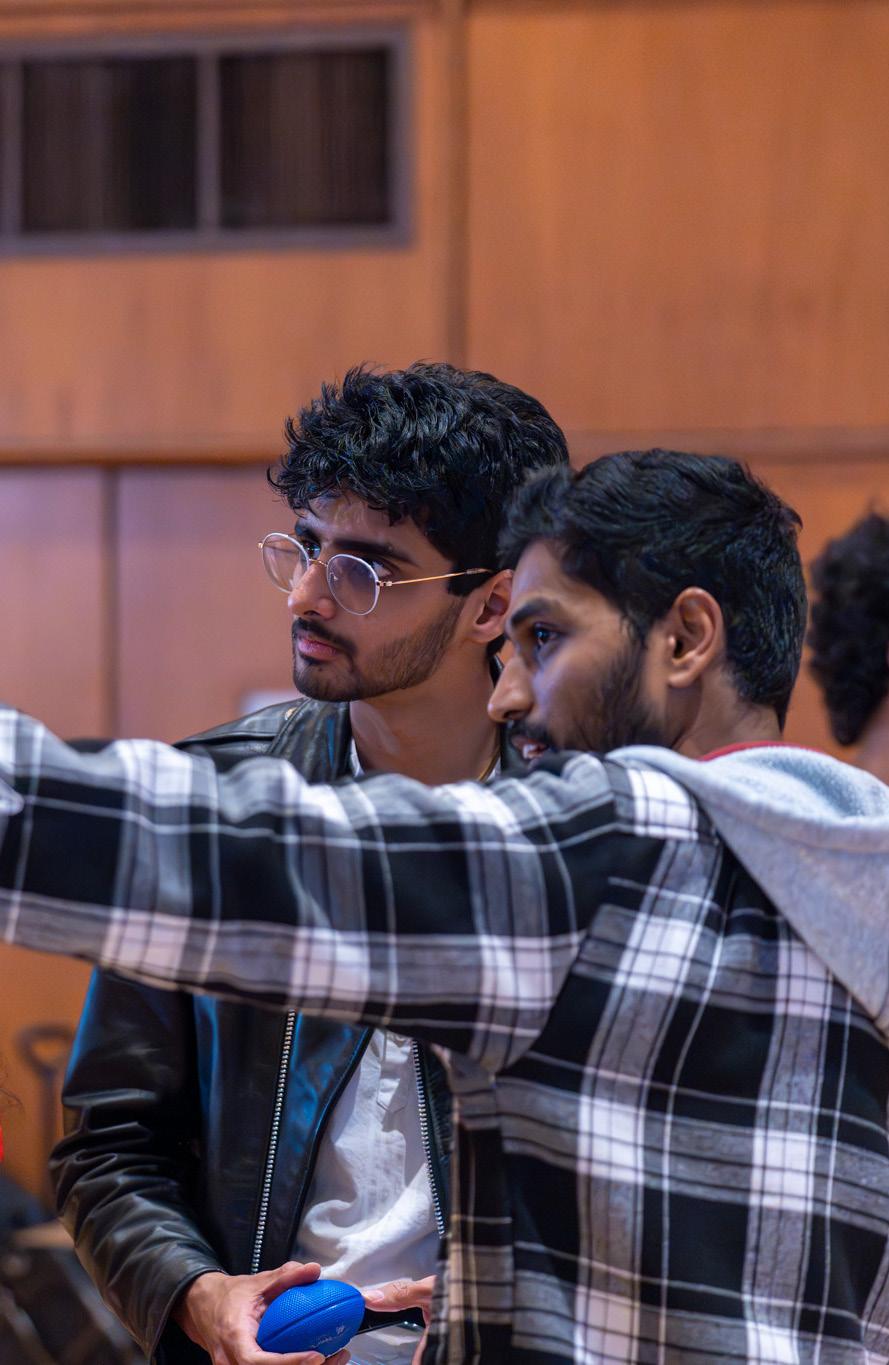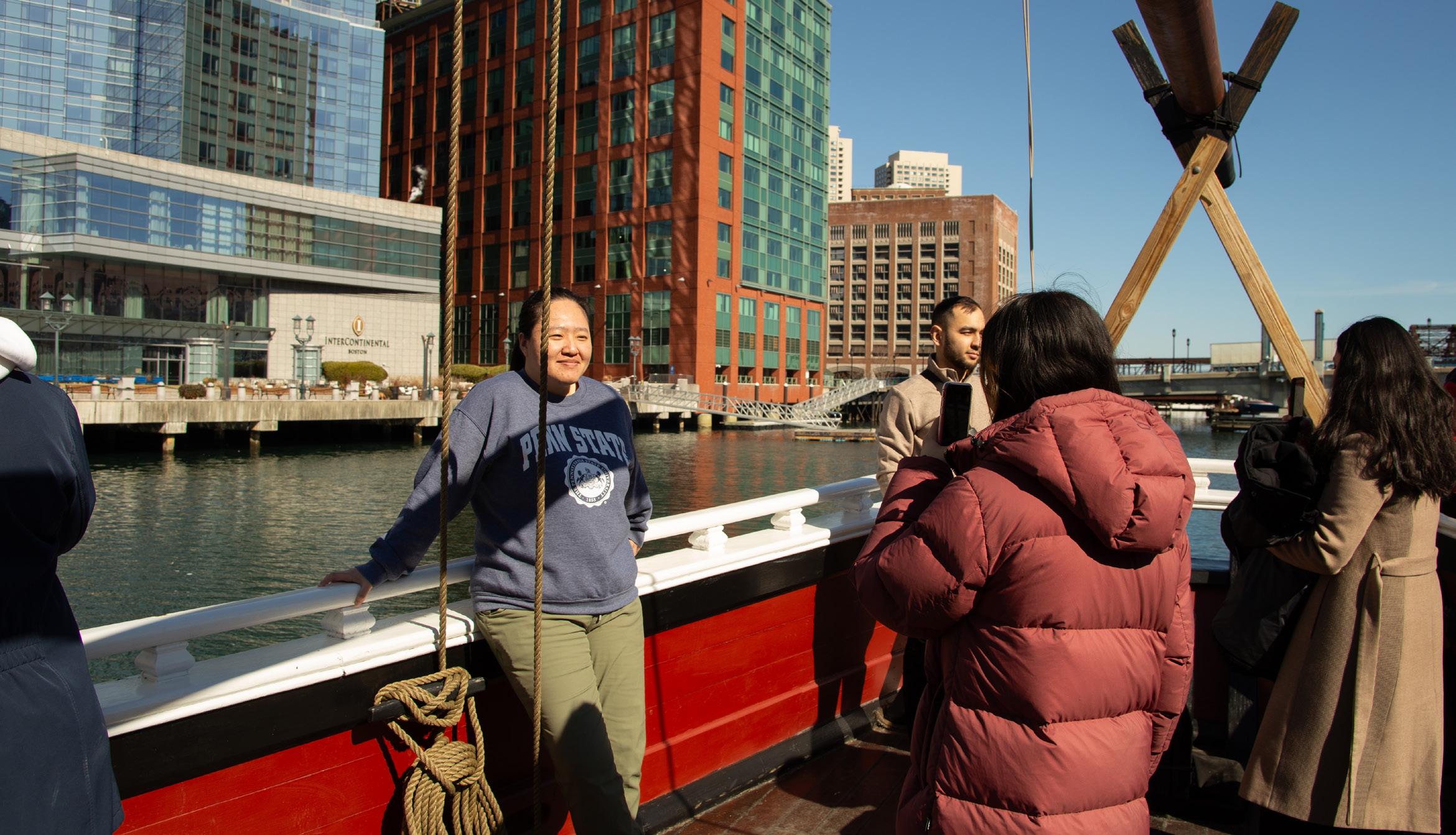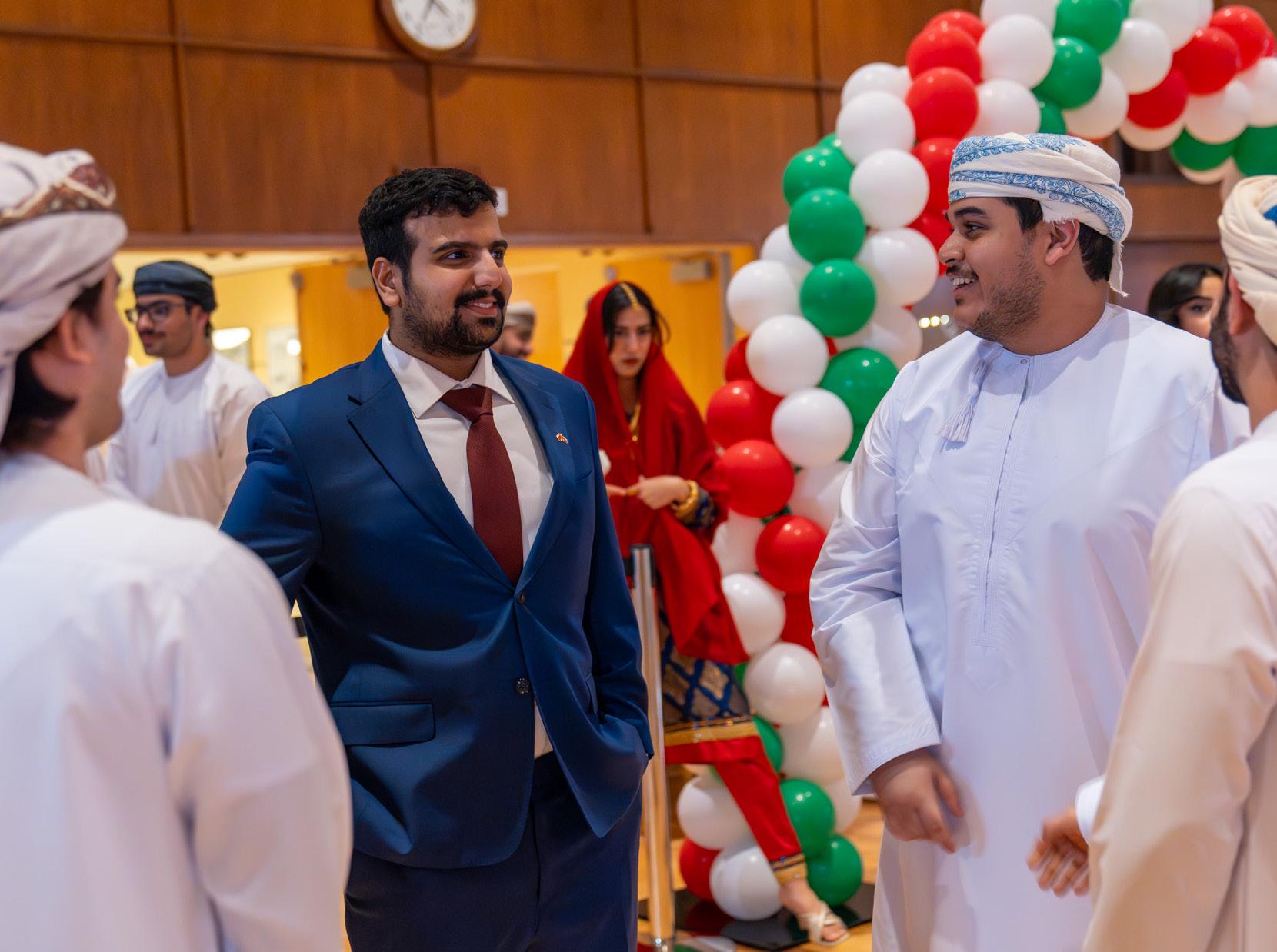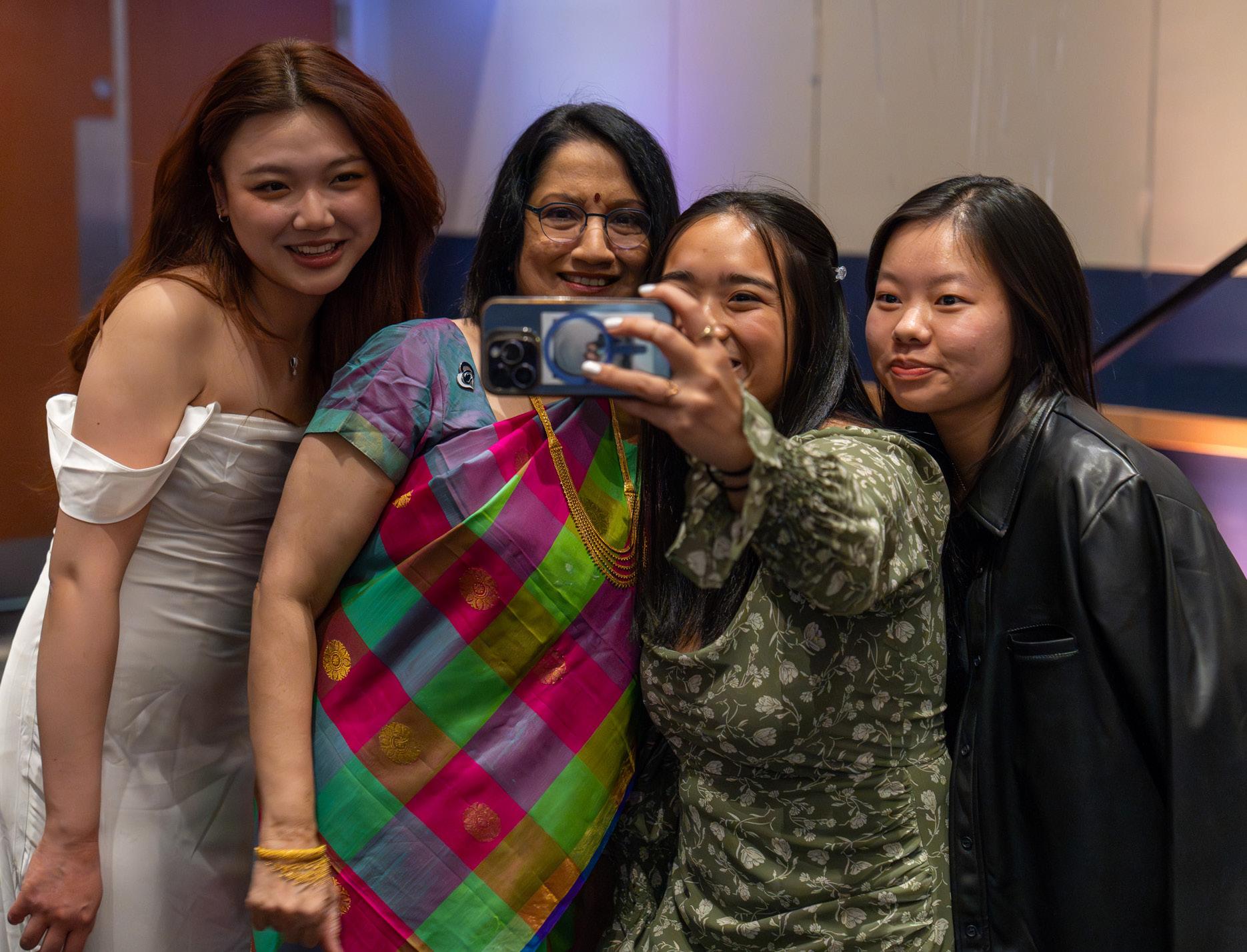Penn State Global
Advancing Cultural Understanding, Global Engagement, and International Community
2024 - 25





Advancing Cultural Understanding, Global Engagement, and International Community
2024 - 25




Thank you for taking the time to engage with our 2024-25 Penn State Global Impact Report. The global reach of Penn State is exceptional and continues to grow. Global engagement is at the core of our mission as a University and is pervasive through all of Penn State’s activities: student learning and engagement, the work of our exceptional faculty, and the communities we impact, here in Pennsylvania, the nation, and around the world.
Throughout this report, you will see examples of this engagement that sets Penn State apart from its peers. This is not hyperbole; Penn State truly is a leader in the field of international higher education, as demonstrated by the university’s recognition with the Simon Award for Comprehensive Internationalization in early 2025. This is the most prestigious award in the field of international education – as my colleague, Dr. Jody Pritt, puts it, it’s akin to our Heisman trophy or Oscar.
The entire University earned this award through
the combined efforts of students, faculty, staff, administrators, and our campus and local communities. Penn State Global is only responsible for some aspects of the vast global engagement across the University, and we are grateful to all our partners, both within and outside the University, for helping us to achieve this recognition. Our internal and external collaborations are critical to our success.
We are making plans to celebrate the Simon Award this year across the University and beyond. I anticipate that it will serve as a catalyst for further innovation and expansion of Penn State’s global engagement. Ultimately, the vision is to advance cultural understanding and bring humanity closer together to collaborate, so that we can collectively address the global challenges that currently impact lives and our environment locally and around the world.
Sabine Klahr, interim vice provost
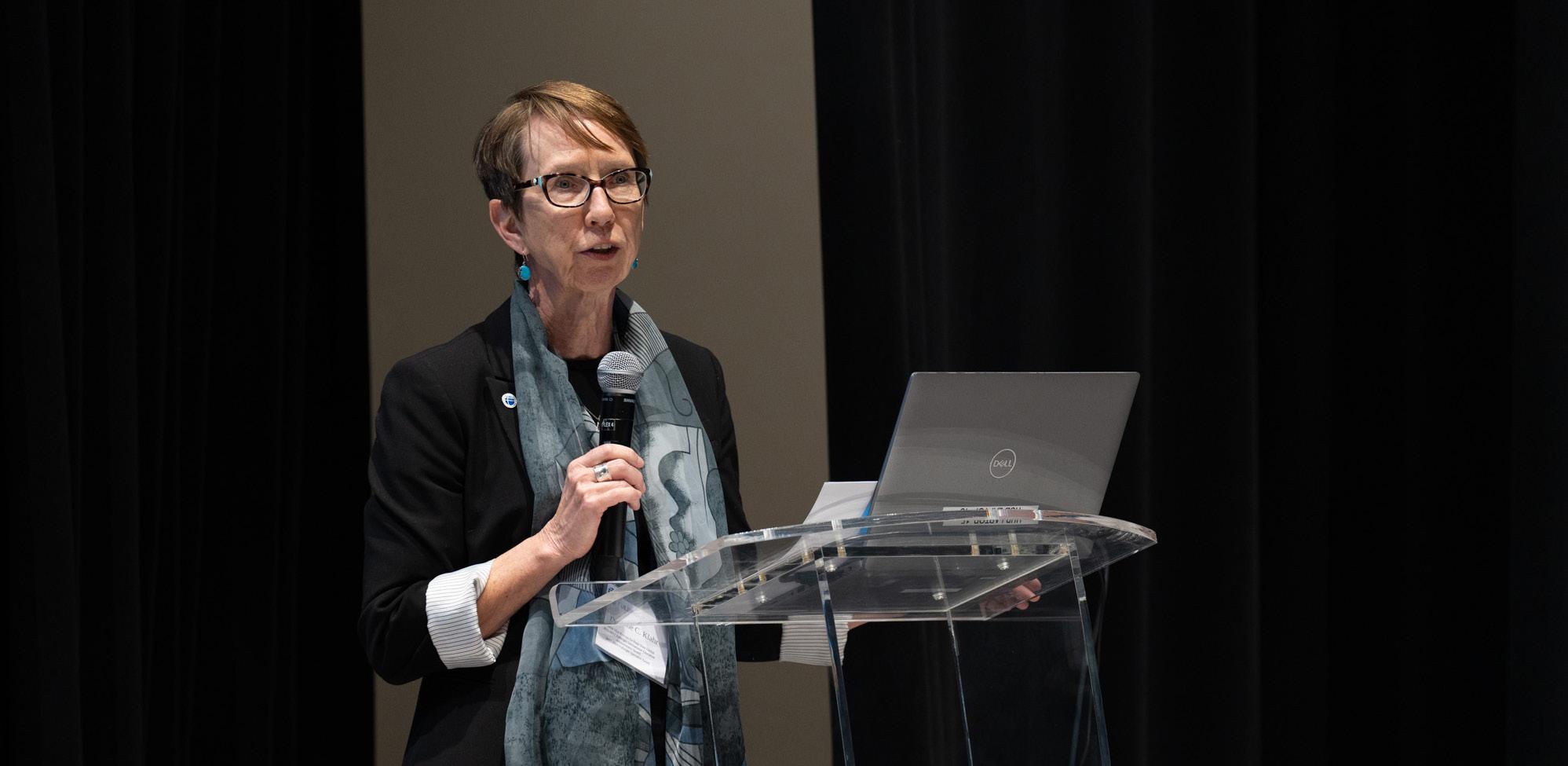


Penn State wins Simon Award for Comprehensive Internationalization, the highest award in the field of international education
Penn State has been named a recipient of the 2025 Senator Paul Simon Award for Campus Internationalization, the highest recognition in the field of international education, awarded by NAFSA: Association of International Educators. Serving more than 10,000 members and international educators worldwide, NAFSA is the largest nonprofit association dedicated to international education and exchange.
Penn State is one of five institutions in 2025 to receive the Comprehensive version of the award — recognizing internationalization across campus — along with the University of Arizona, the University of Georgia, Notre Dame University, and San Diego State University. NAFSA also awards the Spotlight version of the award, which highlights a single program or initiative.

“At Penn State, we believe that global engagement is not just an opportunity — it is a responsibility,” said Neeli Bendapudi, president of Penn State. “This recognition is a testament to the dedication of our students, faculty and staff in fostering a culture of international collaboration, engagement and innovation. The Simon Award reaffirms our commitment to preparing global citizens who will lead with curiosity, empathy and purpose. We are honored to be recognized among institutions that share our vision for a more interconnected world.”
The application process is highly competitive, and winners are chosen by a committee of professional peers with proven success of their own.
“This prestigious award is a reflection of the excellence in internationalization at every level of our academic enterprise. Our students, faculty who engage in global teaching and research, and the staff who provide support for these programs, all play a significant role in our success,” said Tracy Langkilde, Penn State interim executive vice president and provost. “Penn State plays an important role in educating the next generation of global citizens, and I couldn’t be more proud of our entire community.”
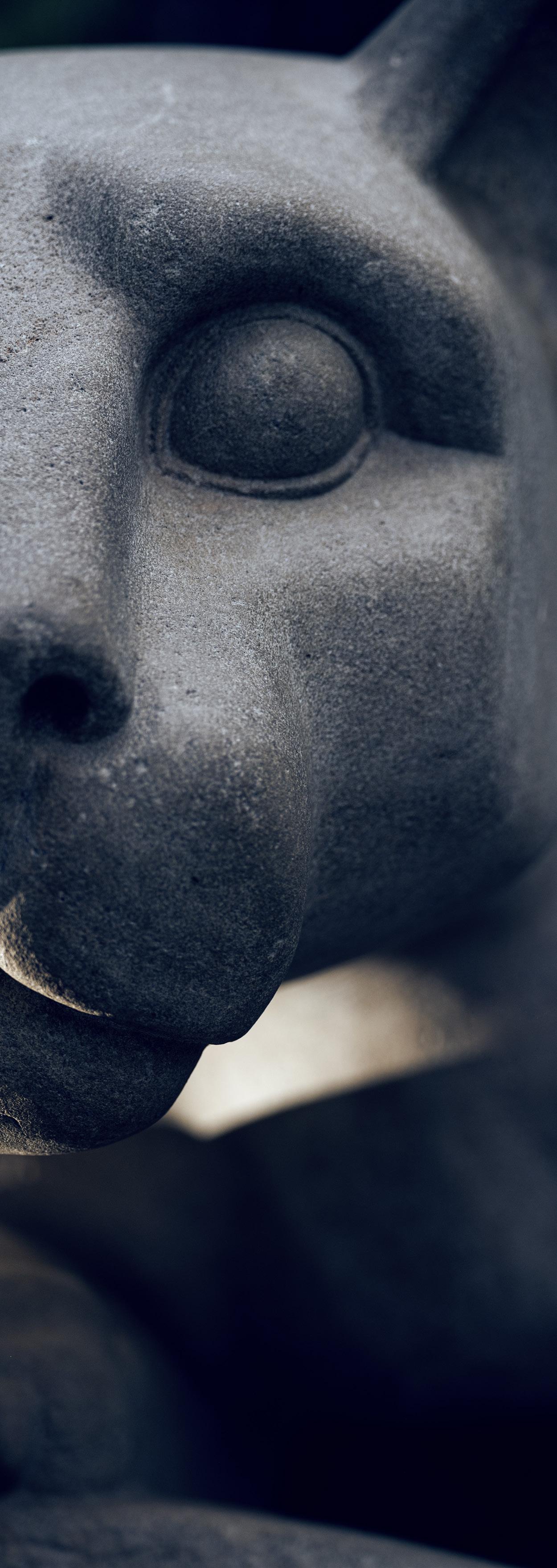
Sabine Klahr, interim vice provost, Penn State Global Penn State’s global impact, which benefits Pennsylvania, the nation, and the world, is at the core of our land-grant mission.”
The Simon Award is named for the late Sen. Paul Simon of Illinois. Simon served his state and the nation as a strong voice for civil rights, prison literacy, peace initiatives and international education. He was a strong advocate throughout his career for international education, using his positions on various committees in the U.S. Senate to advocate for exchange. His leadership in this area was especially evident in his robust support, along with Sen. David Boren, for the creation of the National Security Education Program, which addresses critical national security deficiencies in language and cultural expertise.
Simon’s vision for this program was ambitious, with a goal of sending 500,000 U.S. students to study abroad each year for a semester or summer term. In his forward to NAFSA’s 2003 task force report on education abroad, Simon noted, “If we want to improve our nation and the world, we must be willing to sacrifice a little. This major national initiative and the recommendations of [NAFSA’s] Strategic Task Force on Education Abroad can lift our vision and responsiveness to the rest of the world.”
Penn State’s recognition comes after years of internationalization efforts. The University is in the top 20 institutions in the country in both hosting international students (with nearly 10,000 across all campuses) and sending students abroad (sending nearly 3,000 students last academic year), according to the Institute of International Education. In addition, Penn State is consistently a top producer of Fulbright scholars, ranking No. 1 in the country for three of the last five years (2019, 2022, 2023), and supports the largest number of sponsored international students in the U.S., with more than 1,200 on campus.
Penn State is broadly recognized for its international impact, particularly in the area of sustainability. The University ranks No. 2 in the U.S. in the QS Sustainability rankings and No. 4 in the nation in the Times Higher Education Impact Rankings. Penn State is also top 100 in the world in nearly all the major global University rankings.
“This award is a testament to the exceptional global engagement of our University community, the expertise of our staff in Penn State Global, and the support from University leadership,” said Sabine Klahr, interim vice provost for Penn State Global. “Penn State’s global impact, which benefits Pennsylvania, the nation and the world, is at the core of our land-grant mission. I am so very proud of our students, faculty and staff who understand that global collaboration is key to developing a peaceful world in which all can thrive.”
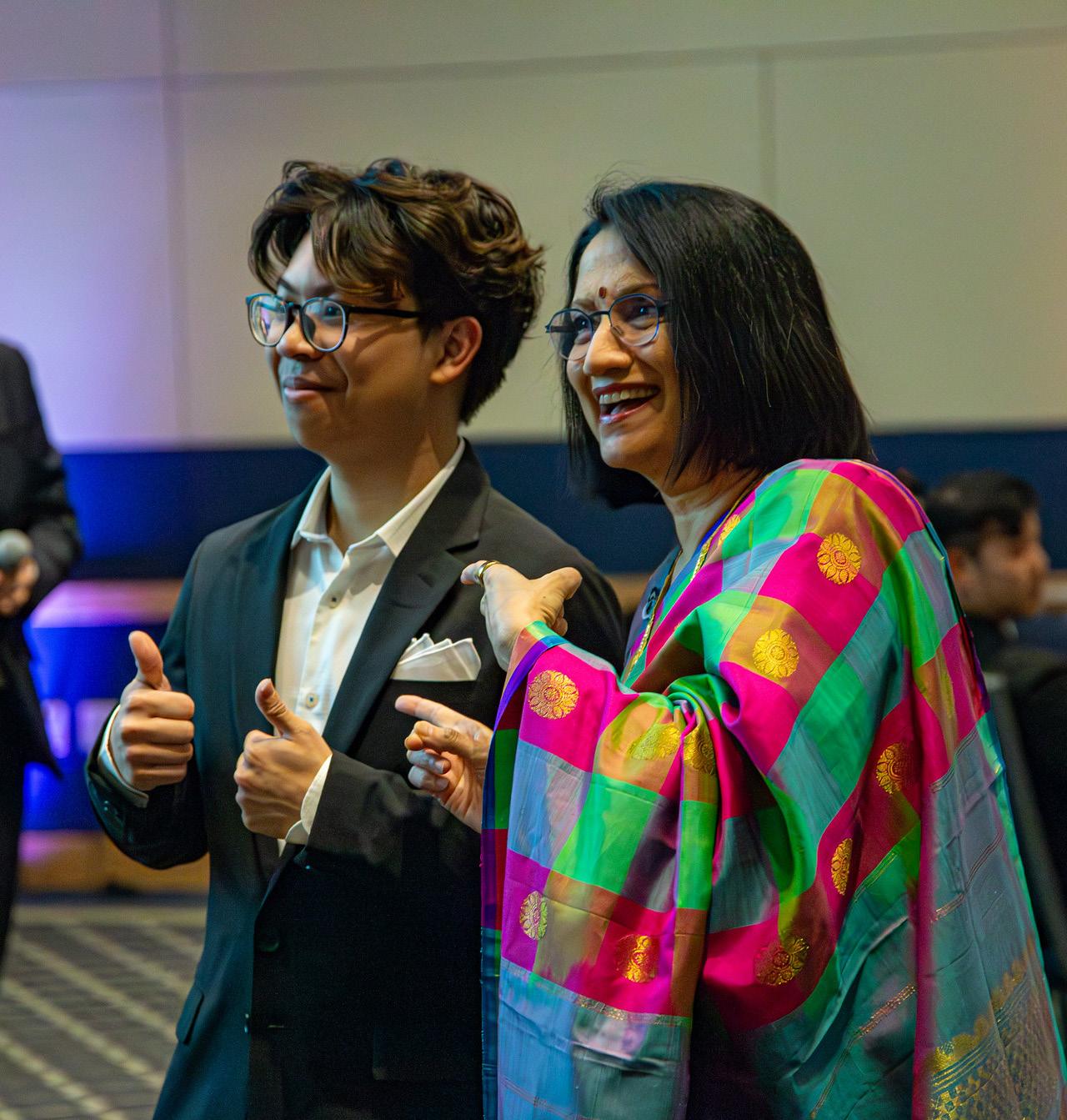
“
“At Penn State, we believe that global engagement is not just an opportunity it is a responsibility.”
Neeli Bendapudi, president, Penn State
Dr. Mark Brennan, Professor of Agricultural Sciences, serves as UNESCO Chair in Global Citizenship Education for Peace through Youth and Community Engagement at Penn State. This role has been active at Penn State for the last twelve years and has continued to grow. In addition to its youth and community development and civic engagement missions, the Chair is starting to engage more deeply in global citizenship education.
“Global citizenship cuts across all colleges and audiences of our university,” said Brennan. “It is also essential for people of all ages in our ever increasingly smaller world. With this we can help shape more peaceful, civil societies at home and abroad.”
The United Nations Educational, Scientific and Cultural Organization (UNESCO) “seeks to build peace through international cooperation in education, sciences and culture.” Their programs, as most U.N. programs do, center around the U.N. Sustainable Development Goals. The organization focuses on providing real and impactful opportunities for engagement and development in the areas of education, science, and culture to its 193 member countries.
A UNESCO chair provides opportunities for connection, funding and program support from UNESCO to create and implement programs on an international level. It is a way to provide opportunities for research to create impact on a broad scale in a short amount of time.
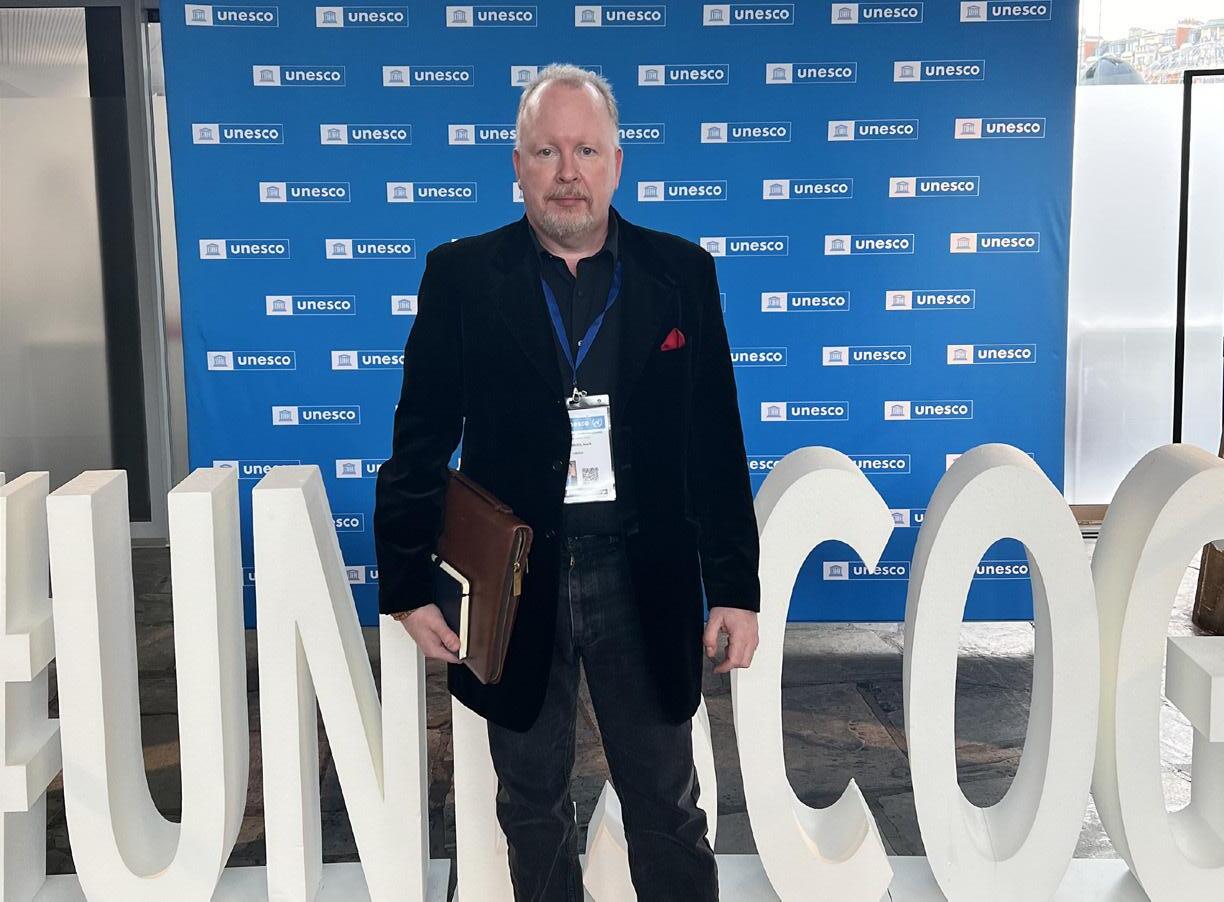
This new focus for the Chair allows direct contributions to some of Penn State Global’s major initiatives, such as providing opportunities for refugee students to come to Penn State to advance their academic careers and personal/professional growth. Similarly, the Chair will also be working with the Scholars at Risk program, which focuses on preventing threats to academic freedoms, assistance and placement of refugee scholars at Penn State.
Penn State currently holds two UNESCO Chairs – Brennan’s, and one held by Dr. Osama Awadelkarim, which focuses on nanotechnology. Dr. Awadelkarim’s Chair sits in the College of Engineering.
“[The Chair] allows Penn State to be a major player in shaping global educational programming and policy,” said Brennan. “Penn State is one of the greatest universities in terms of producing new knowledge and discovery. Our ability to have this knowledge move directly into global practice is an amazing thing and has massive impacts for advancing the human condition.”
Brennan is no stranger to making significant global impact, as he was recently awarded the UNESCO Janusz Korczak Jubilee Medal, an award reserved for those who are “most involved with human rights, youth rights, and education for peace.” This award came in large part due to the activities of the Youth-as-Researchers program, which was developed to ensure that youth voices are included in programming and policy decisions.
“Over 50% of the planet is under age 25,” Brennan said. “We’ve got to engage them.”
The program took a graduate level social science research methods course and worked with young people to put it into usable language. Using this training, they then go on to conduct research on topics of their choosing. Brennan and his co-facilitators (including Jamison Malcolm, one of Brennan’s PhD students) provide advice when asked, but do not tell them what to study or how to study it. They have complete ownership. At the end of their research project, they have data and that is “hard to ignore.”
While youth and community development will continue to be at the core of the Chair’s work, Brennan is excited to expand.
“The Chair program presents some amazing opportunities that align with our land grant mission,” said Brennan.
We are one of two U.S. universities to have more than one UNESCO chair.
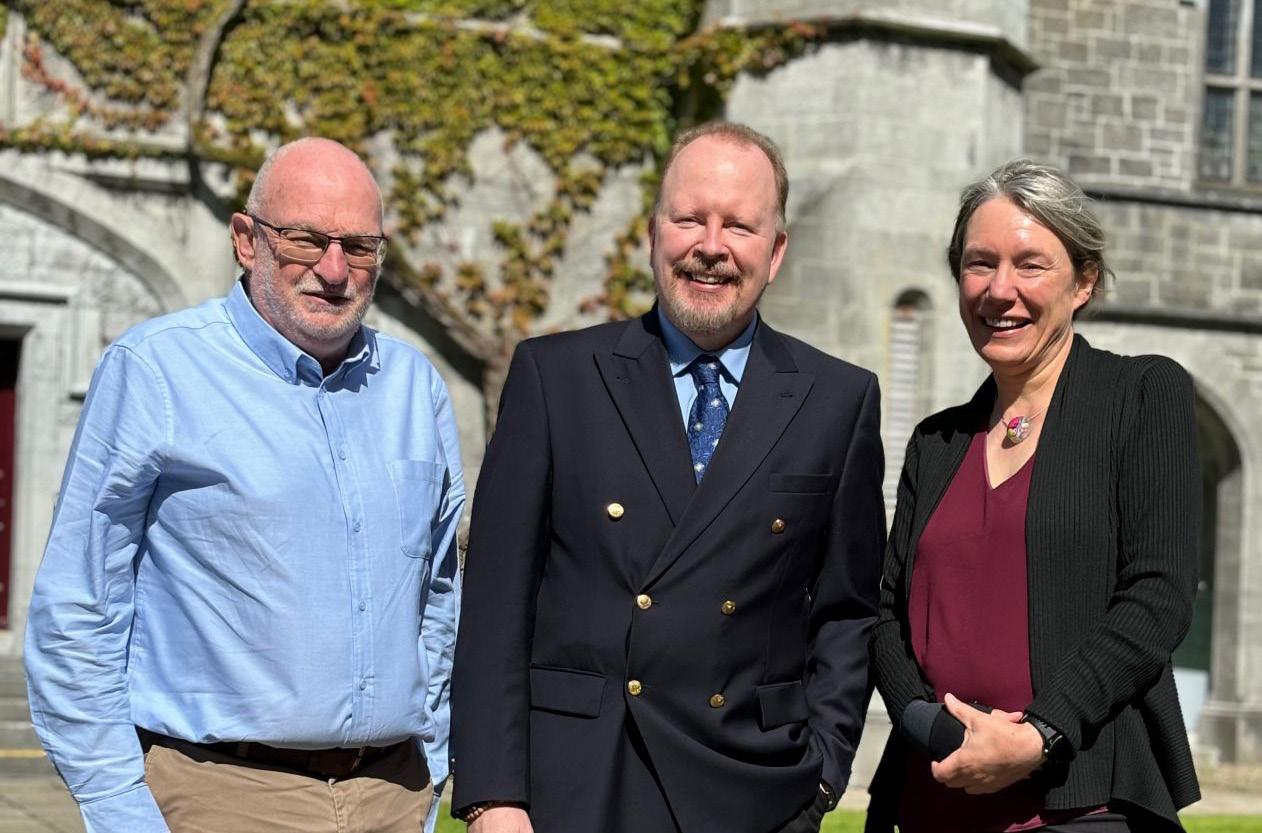
UNESCO Center at Galway
The UNESCO programs at Penn State and Galway have been working extensively together for nearly 25 years. This partnership initially started with academic collaborations and joint research as part of the establishment of the Child and Family Research Center at the University of Galway. Penn State brought a core expertise in the areas of community development and engagement to the new Centre. As a result, the first UNESCO Chair in Ireland (Children, Youth, and Civic Engagement) was awarded to Professor Pat Dolan in 2009, followed by the UNESCO Chair at Penn State (Global Citizenship Education for Peace through Youth and Communities) in 2012. Through the course of this close partnership, student and faculty exchanges have taken place, several Fulbright Scholar established, dozens of peer reviewed journal articles written, over 20 major research projects initiated, and over a dozen major UN policy briefs developed. Through these and other efforts across our colleges/departments, Galway has emerged as a key international partner for the University.
“
With this work, we can facilitate positive outcomes quickly and make things better for a lot of people.”
Mark Brennan, UNESCO Chair in Community, Leadership, and Youth Development
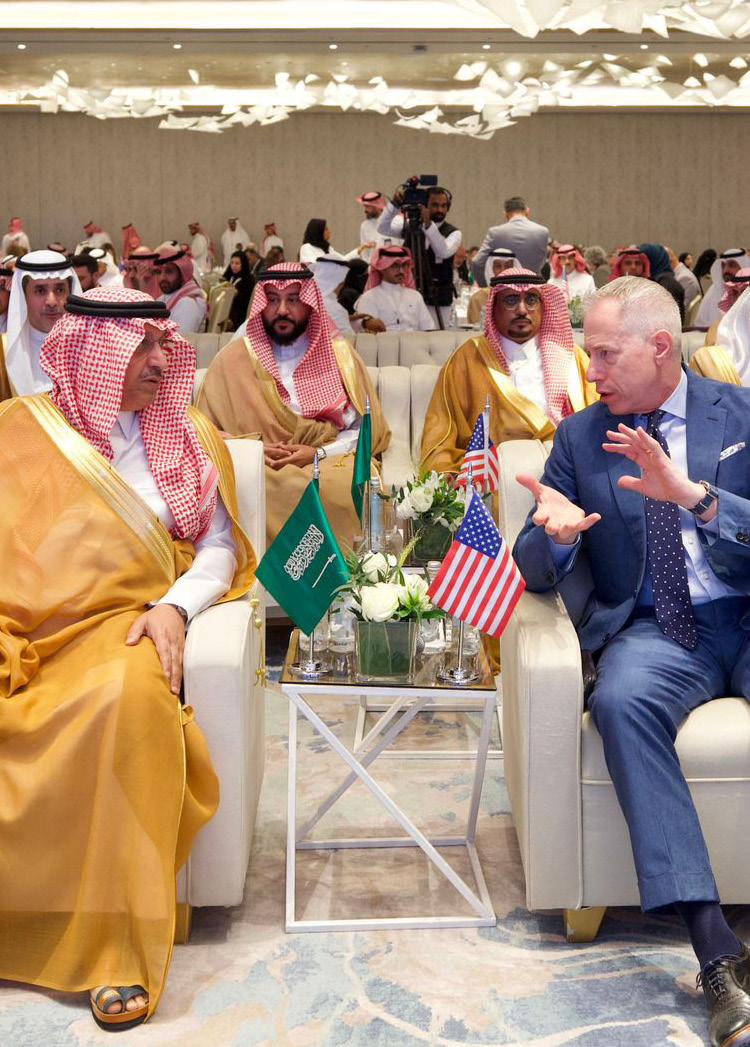
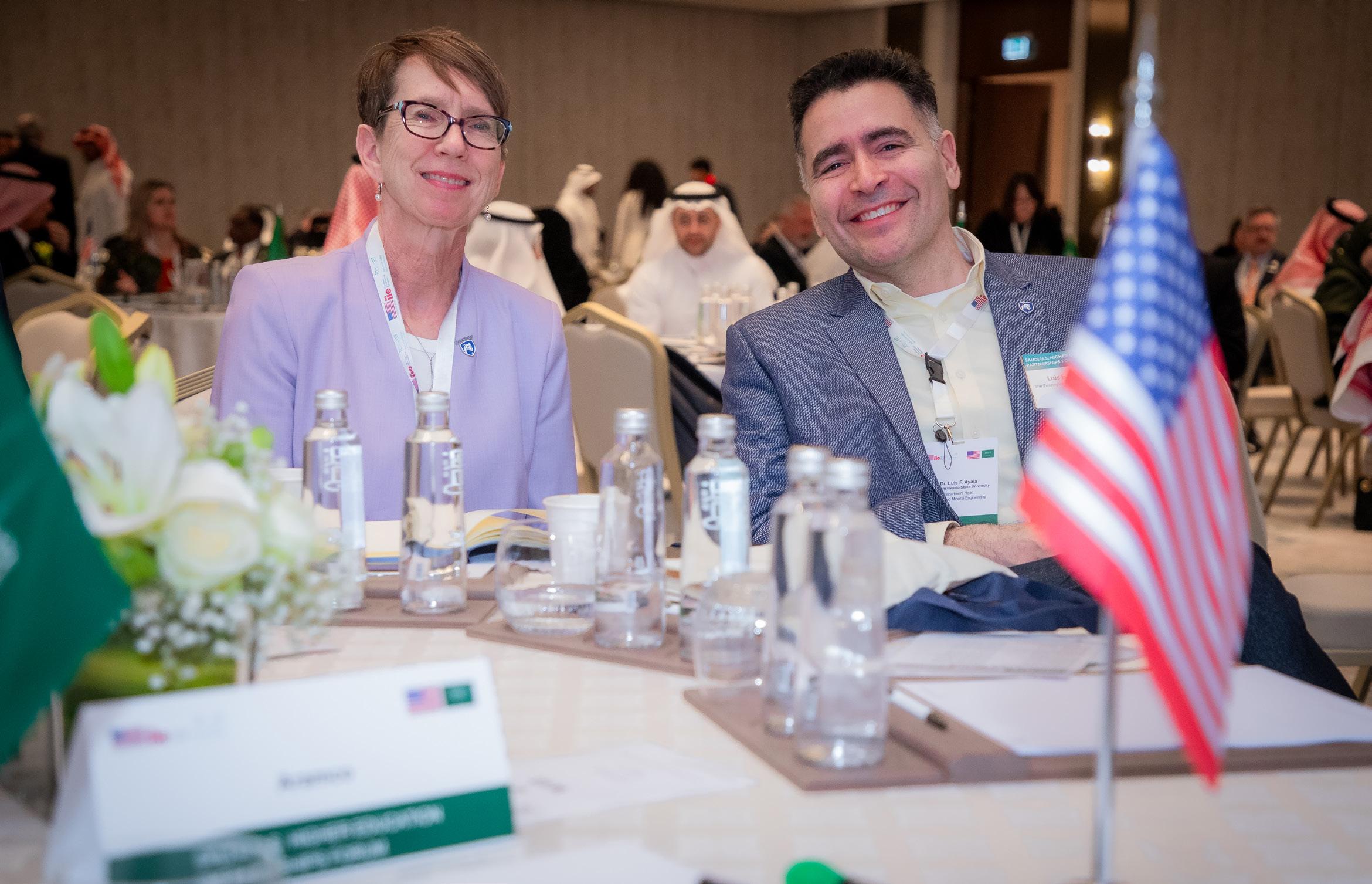
“In November, Penn State representatives attended the Saudi-US Higher Education Partnerships Forum, which was organized by the Saudi Ministry of Education in cooperation with the US Embassy in the Kingdom and the Institute of International Education (IIE). With the participation of government and business leaders in the two countries, and leaders of more than 80 Saudi and American universities, the forum’s purpose was to explore and deepen educational cooperation between the two countries.
“The Kingdom of Saudi Arabia seeks to be a center for education at the regional and global levels, and that education in the Kingdom aspires to prepare students capable of competing globally by building an educational system characterized by diversity and global openness,” His Excellency the Minister of Education, Mr. Yousef bin Abdullah Al-Benyan, said.
During the forum, university leaders and government officials from Saudi Arabia and the United States discussed supporting strategic academic cooperation; the feasibility of effective educational partnerships; the future of joint research initiatives, and student, faculty, staff and researcher exchange programs; and new educational programs.
Penn State’s Sabine Klahr, interim vice provost for Penn State Global, attended these meetings, alongside Luis Ayala, Chair of the Department of Energy and Mineral Engineering in the College of Engineering. In addition to the Forum, Klahr and Ayala also visited two universities where Penn State currently has collaborations and is seeking to expand engagement: King Abdullah University of Science and Technology (KAUST) and King Fahd University of Petroleum and Minerals (KFUPM). Additionally, a visit to ARAMCO was also organized. ARAMCO is an important partner and sponsor of students for Penn State. Overall, Penn State hosted over 600 Saudi students in fall 2024, and has longstanding partnerships with several sponsors.
The forum included attendance of high-level officials from more than fifteen Saudi ministries, authorities, and institutions to support the work of the forum and discuss opportunities for cooperation.
The Saudi Minister of Education, His Excellency Yousef bin Abdullah Al-Benyan and US Ambassador, Michael Ratney signed a Memorandum of Understanding between the two countries as part of the forum’s activities designed to support academic and joint research exchange and cooperation, and to enhance opportunities for the movement of students, researchers and faculty members.
“The US government affirms its full commitment to supporting international education and enhancing international exchange and cooperation, as it is of great importance to the US Department of State, especially the Bureau of Educational and Cultural Affairs,” said Ambassador Ratney.
The forum offered an excellent opportunity to learn about higher education in Saudi Arabia, the social and economic transformation in the country, and the Kingdom’s vision for the future. We are looking forward to more strategic engagement with Saudi institutions and sponsors.”
Sabine Klahr, interim vice provost for Penn State Global
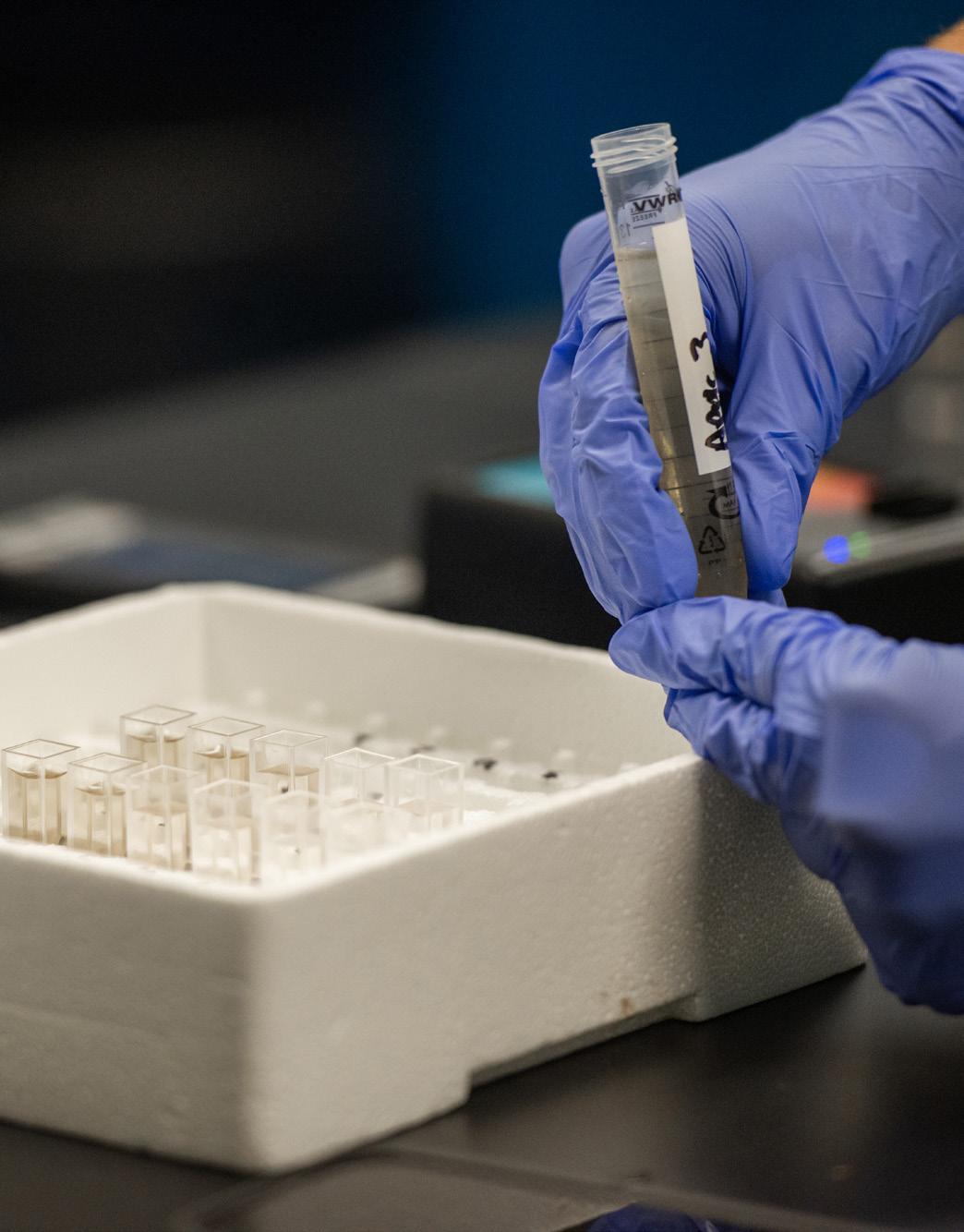
With its fast-growing economy, the world’s largest population, and the new National Education Policy (NEP) since 2020, India has become an important partner for American higher education institutions. At Penn State, the number of partnership agreements with Indian institutions has increased nearly threefold, from 11 in 2023 to 32 in 2024. For example, Penn State Lehigh Valley Chancellor Tina Richardson signed two memoranda of understanding (MOUs) between the campus and two Indian universities. Penn State Harrisburg forged new partnerships with several Indian institutions, facilitating transitions for students pursuing academic programs between Penn State Harrisburg and these institutions.
Amongst our growing engagement in India, the Indian Institute of Science (IISc) has emerged to become a top strategic partner for Penn State. Featuring a series of multidisciplinary workshops, joint seed projects, delegation visits, and research field trips. “I am delighted that faculty at Penn State and IISc are very eager to engage in research collaboration and that this emerging strategic partnership is quickly gaining momentum,” said Sabine Klahr, interim vice provost for Global. “This demonstrates that dedicating resources strategically at both partner institutions to grow collaborations is effective, ultimately leading to a long-term, multi-disciplinary partnership that amplifies each university’s strengths and yields transformative outcomes.”
Nestled in Bangalore, IISc is a leading public research university in science, engineering, and management. Since it was established in 1909, IISc has become one of the highest citation-per-faculty globally. Like IISc, Penn State is also a top-ranked research university and Pennsylvania’s sole land-grant institution, founded with a mission of high-quality teaching, expert research, and global service. With a shared mission, vision, and complementary strengths, the primary contacts in the global offices at both institutions met regularly to implement a survey-informed, actionable approach for faculty of both universities to initiate collaborations across a broad range of disciplines.
Anna Marshall, associate director for Asia Partnerships, and Sabine Klahr, published “Six Steps for Building Multidisciplinary University Linages,” in IIENetworker Magazine in Fall 2024.
The model serves as a template for creating multi-dimensional, interdisciplinary, and sustainable collaborations with new and emerging partners at Penn State, and was first utilized with IISc. Similar steps in partnership development have been utilized with other partner institutions.
Collaboration between Penn State and IISc has continued to expand. In July 2024, Penn State and IISc announced the awardees for the 2024-25 cycle of their collaboration program. These awardees comprise four collaborative projects that connect Penn State and IISc researchers with their complementary skill sets. The selected projects supported cross-disciplinary efforts covering diverse and broad topics to address global challenges or matters of significance to India and the U.S., such as sensing and communications with reflective intelligent surfaces, democratization of genome assembly, large-scale distributed learning for democratizing future artificial intelligence (AI), and pesticide transport by means of a vortex ring.
Beyond active research collaboration, an increased number of Inter-University, multi-disciplinary engagement takes place. Ram N. Narayanan, professor of electrical engineering at Penn State, had been appointed to the BEL Chair, or Visiting Chair Professorship, at IISc, from 2024 to 2025. The appointment was made by K J Vinoy, a Penn State alumnus and professor (and prior chair) in the Department of Electrical Communication Engineering at IISc.
During summer 2024, Christopher Scott, Goddard Chair and Professor of Ecosystem Science & Management, traveled to IISc, presenting his research topics, and conducting a research field visit to the Himalayan research sites by Tejal Shirsat (see picture below). Scott and IISc researchers were collaborating on joint scientific publications and exploring external funding sources to support future collaborative work. Specifically, the
Divecha Centre for Climate Change, the Glaciers and Renewable Energy groups at IISc, shared their interest to collaborate with Penn State researchers and programs related to climate change assessment and mitigation, hydrology and water resources, and the cryosphere. Scott observed that students supported by the Divecha Centre are highly motivated group, and he is pondering on ways to foster further student-to-student exchange.
Jacqueline O’Connor, Professor of Mechanical engineering at Penn State and Santosh Hemchandra, Associate Professor from the Department of Aerospace Engineering at IISc, had been awarded a grant from the Office of Naval Research (ONR) and ONR Global. This joint project focuses to fundamental understanding of flow and flame instabilities and the new grant will provide them an avenue to explore new territory in this research area.
In November 2024, Sandeep Prabhu, Department Head and Professor of Immunology and Molecular Toxicology at Penn State and his colleagues hosted the 18th International Conference on Trace Elements in Man and Animals in Bangalore, India. The location makes it convenient for the active participation of IISc community and two faculty members and eight graduate students had registered to participate in the annual conference. Meanwhile, Penn State delegation, led by Prabhu, will visit IISc to explore potential collaborative projects and funding opportunities.
“This grant builds on a long-standing partnership between my team at Penn State and Dr. Hemchandra’s group at IISc. We’re particularly excited that this work is funded by ONR and ONR Global, which provides us the resources to make significant strides in research.”
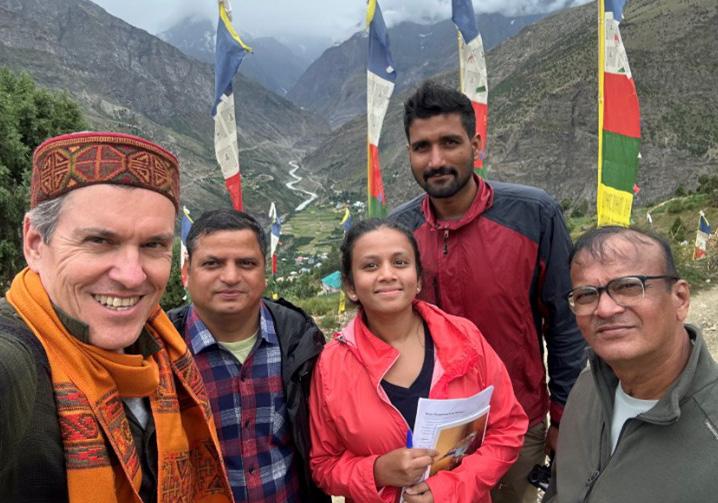
Christopher Scott, Goddard Chair and Professor of Ecosystem Science & Management. He and a group of IISc researchers visited the Himalayan research sites by Tejal Shirsat during summer 2024.
Penn State has been ranked first in the nation in faculty Fulbright Scholar awards by the U.S. Department of State’s Bureau of Educational and Cultural Affairs, with 12 faculty members offered Fulbright awards for academic year 2023-24. An additional four faculty members have been named Fulbright Specialist Award recipients.
Through the Fulbright program, Penn State faculty members, staff and administrators have opportunities to conduct advanced research, teach or do both, as well as attend seminars, abroad. The program also affords recipients the opportunity to interact with, and make an impact on, their host communities during their Fulbright tenure.
The Fulbright competition is administered at Penn State through the Faculty Fulbright office, led by Faculty Fulbright Adviser Sylvester Osagie. The University sponsors discipline-based panels, which help to support faculty applications for Fulbright awards and have played a significant role in Penn State’s status as a Fulbright top producer for over a decade running.
Fulbright is the U.S. government’s flagship international educational exchange program. It also is among the largest and most diverse exchange programs in the world. Since its inception in 1946, more than 400,000 participants from all backgrounds and fields — including recent university graduates, teachers, scientists, researchers, artists and others, from the U.S. and more than 160 other countries — have participated in the Fulbright Program. Fulbright alumni have returned to their home countries to make an impact on their communities thanks to their expanded worldview, a deep appreciation for their host country and its people, and a larger network of colleagues and friends.
Five Penn State students were also awarded Fulbright awards for the 2023-24 academic year. The Fulbright student finalists are among the approximately 2,100 U.S. citizens who earned funding to study, conduct research and teach abroad during the 2023–24 school year. Recipients are selected based on their academic and professional achievement, as well as their record of service and leadership potential. Penn State also hosted 37 Fulbright students from around the world.
Each year, the U.S. Department of State works with its 140 partner countries to give graduating college seniors, graduate students and young professionals the opportunity to work, live and learn abroad.
014.
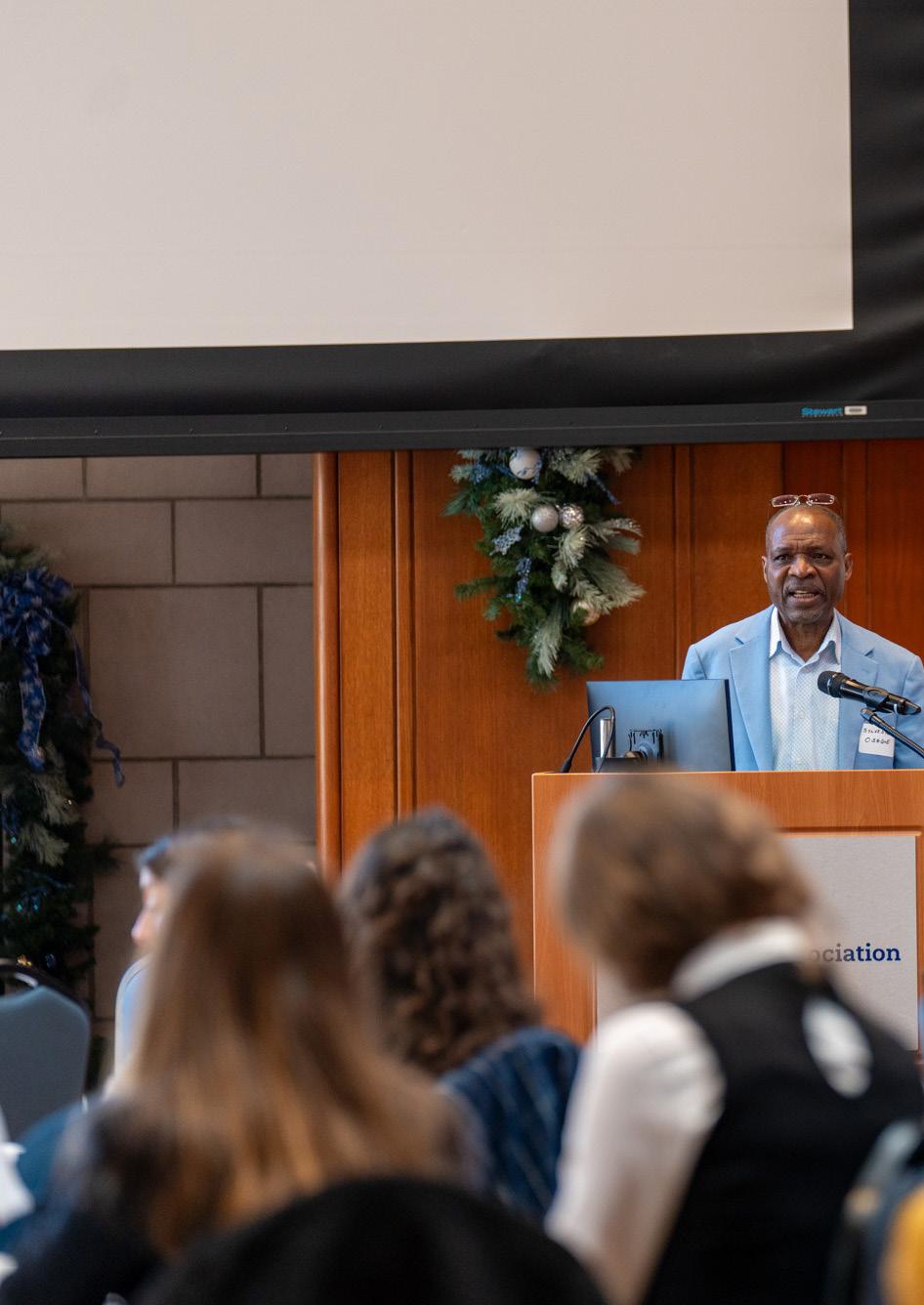
This is the second year in a row and the third time in the last five years that Penn State has been the No. 1 producer of Fulbright Scholars, with the University also achieving this status in 2019 and 2022.
Alexandra Persiko, interim director of Global Partnerships in Penn State Global, received a Fulbright IEA award in 2024, notable not only because she was one of 14 university administrators across the U.S. to garner such an award this year, but also because of her unique connection to the program through her mother, Alice Ann, who completed a Fulbright student program in Germany in 1957.
“I wouldn’t be here or have grown up with that spirit of global in mind if it hadn’t been for my mother,” Persiko said.
Persiko’s program could not have been more different than her mother’s many years ago. For one, her mother’s program was for an entire year, whereas Persiko’s took place over the span of 12 days.
“I did feel a sense of awe, excitement, looking at something with fresh eyes, and receiving ideas for engagement, just like I imagine my mother did,” Persiko said.
Alice Ann spent a year at the University of Mainz, taking classes and teaching at a girl’s school in town. She took away not only an expanded worldview; her experience had a very tangible outcome. She met her future husband, a young medical student who also led tours for international students.
Persiko, growing up with the sense of possibility and a yearning for things global, decided to study in the U.S. after receiving her Abitur, granted at the end of secondary education in Germany.
“And the rest is history,” she said. “I ended up staying in the U.S., met my husband, had kids, returned to Germany for 10 years, and then found my way to central Pennsylvania.”

Sridhar Anandakrishnan, professor of geosciences, College of Earth and Mineral Sciences; Australia
Amy Carney, associate professor of history, Penn State Behrend; Austria
Robert Chiles, assistant professor of rural sociology, College of Agricultural Sciences; South Africa
Luis Duque, assistant research professor in storage root physiology, College of Agricultural Sciences; Colombia
Renee Flasher, associate professor of accounting, Penn State Harrisburg; Portugal
Shaun Gabbidon, distinguished professor of criminal justice, Penn State Harrisburg; United Kingdom
Faisal Husain, associate professor of history, College of the Liberal Arts; Turkey
Kateryna Makova, professor of biology, Eberly College of Science; France
Katherine Pearson, professor of law and Arthur L. and Sandra S. Piccone Faculty Scholar, Dickinson Law; Canada
Vyacheslav Rotkin, Frontier Professor of Engineering Science and Mechanics, College of Engineering; India
Julio Urbina, professor of electrical engineering, College of Engineering; Peru
John Gershenson, teaching professor, College of Engineering; Botswana
Matthew Parkinson, professor of mechanical engineering, College of Engineering; Dominican Republic
Maung Min, associate teaching professor of business, Penn State Lehigh Valley; Thailand
Ricardo Martinez, assistant professor of mathematics education, College of Education; Argentina
Alexandra Persiko, interim director of Global Partnerships, Penn State Global; France International Education Administrators Program
Penn State Global announced the 2023-24 recipients of its annual awards that recognize the outstanding contributions of individuals and academic programs at Penn State who have helped to advance the University’s global engagement goals.
“It is such a delight to recognize the extraordinary global engagement of faculty, staff, and students at Penn State and celebrate awardees who represent multiple colleges and campuses. In Penn State Global, we are deeply grateful for the inspiring work of our global champions who are at the core of what makes Penn State a global university”
Sabine Klahr, interim vice provost for Global
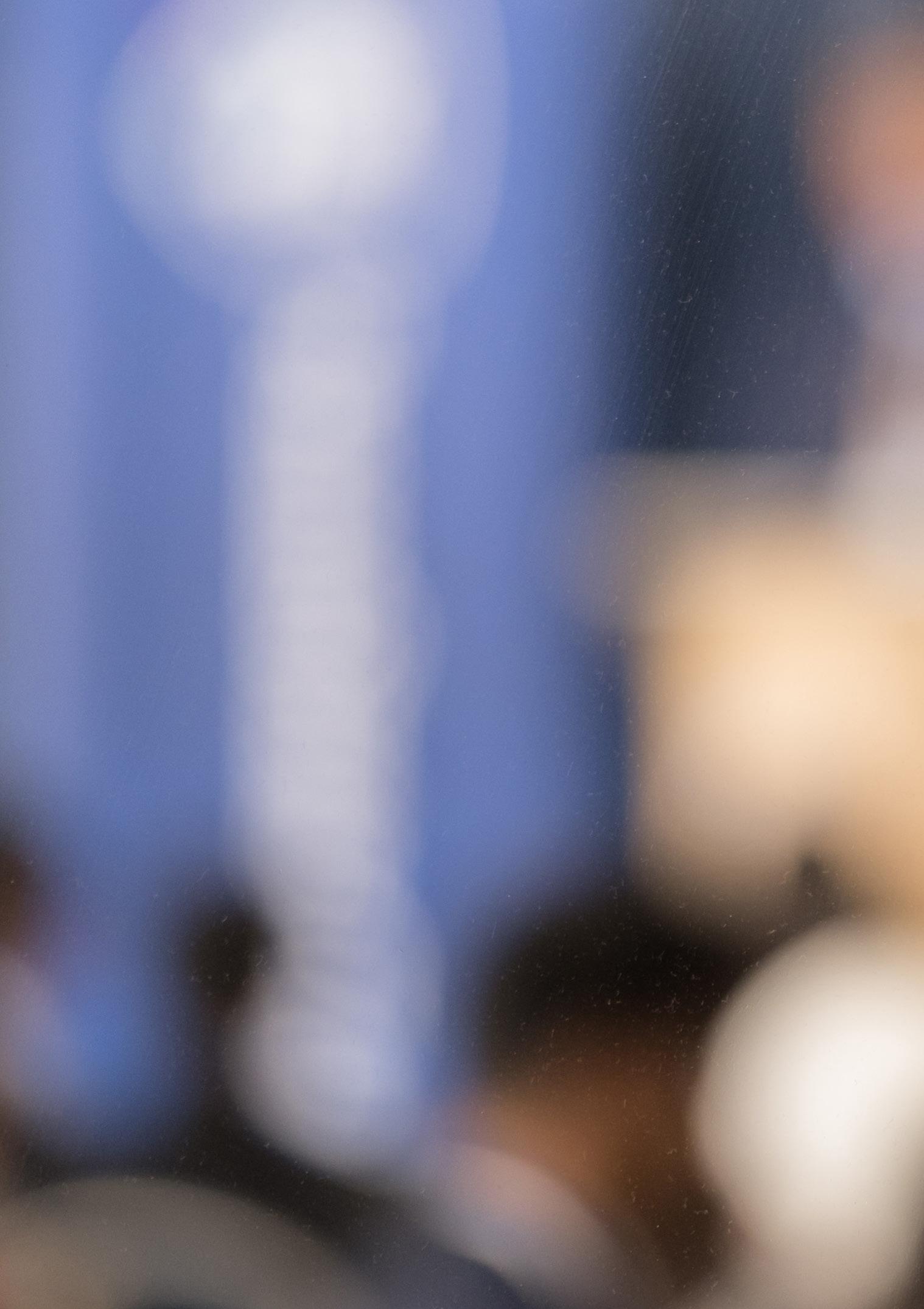
Recipients were honored at an awards ceremony in Robb Hall in the Hintz Alumni Center on March 21.
The purpose of the Advancing a Global Penn State Awards program is to recognize the outstanding contributions of individuals and academic units across the University, including at the Commonwealth Campuses, who have demonstrated success toward achieving the goals of a Global Penn State.
The awards and recipients are as follows:
The Outstanding International Research Award recognizes innovative research projects and initiatives that can be shown to be advancing progress toward one or more of the United Nations Sustainable Development Goals.
This year’s winner was Zoubeida Ounaies, professor of mechanical engineering, director of the Convergence Center for Living Multifunctional Material Systems (LiMC2), and associate director of the Materials Research Institute (MRI).
The Outstanding Program Award recognizes an innovative program at the University that has advanced the vision of a Global Penn State. This award recognizes a Penn State program that is agile and adaptable, and yet robust enough to be innovative and forward thinking.
This year’s award was given to the Global Health Minor program in the College of Health and Human Development, received by Dr. Dana Naughton.
The Unsung Hero Staff Award recognizes an exemplary member of staff or an outstanding team of staff that consistently provide excellent support and leadership for global success at Penn State. These nominees will have conducted their work with excellence over an extended period of time and are known for “doing whatever it takes” to support academic and/or research success for students, staff or faculty.
This year’s winner was Joel Waters of the Department of Undergraduate Students in the Eberly College of Science.
The Global Learning Instructor Award recognizes innovative teaching pedagogies used by outstanding faculty at the teaching/instructor rank when teaching global/international content with excellence.
This year’s winner was Jamie Lee Andreson, assistant teaching professor in the Department of History and Women’s, Gender, and Sexuality Studies in the College of the Liberal Arts.
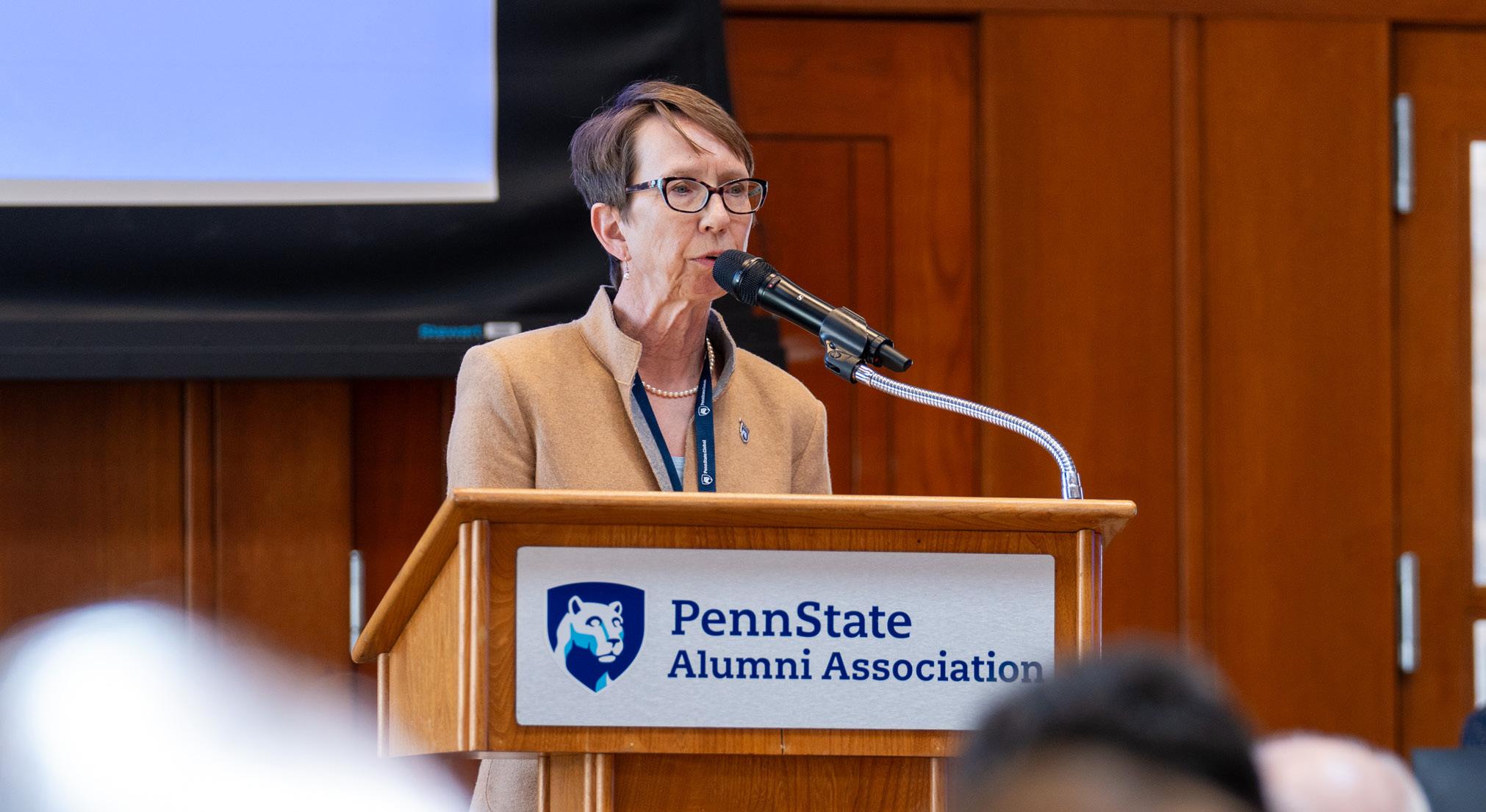
The Early Career Faculty Award recognizes innovative international research projects, excellence in global scholarship, or curricular and experiential leadership surrounding global learning for a tenure-earning faculty member at Penn State.
This year’s winner was Emily Reed, Reference and Instruction Librarian at Penn State Harrisburg.
The Lifetime Achievement Award recognizes an individual who has consistently demonstrated exceptional achievement towards furthering the global vision of Penn State across their career at the University.
This year’s winner was Julio Urbina, professor in the School of Electrical Engineering and Computer Science, College of Engineering.
Dr. David Hughes was the winner of the W. LaMarr Kopp International Faculty Award.
The
of the
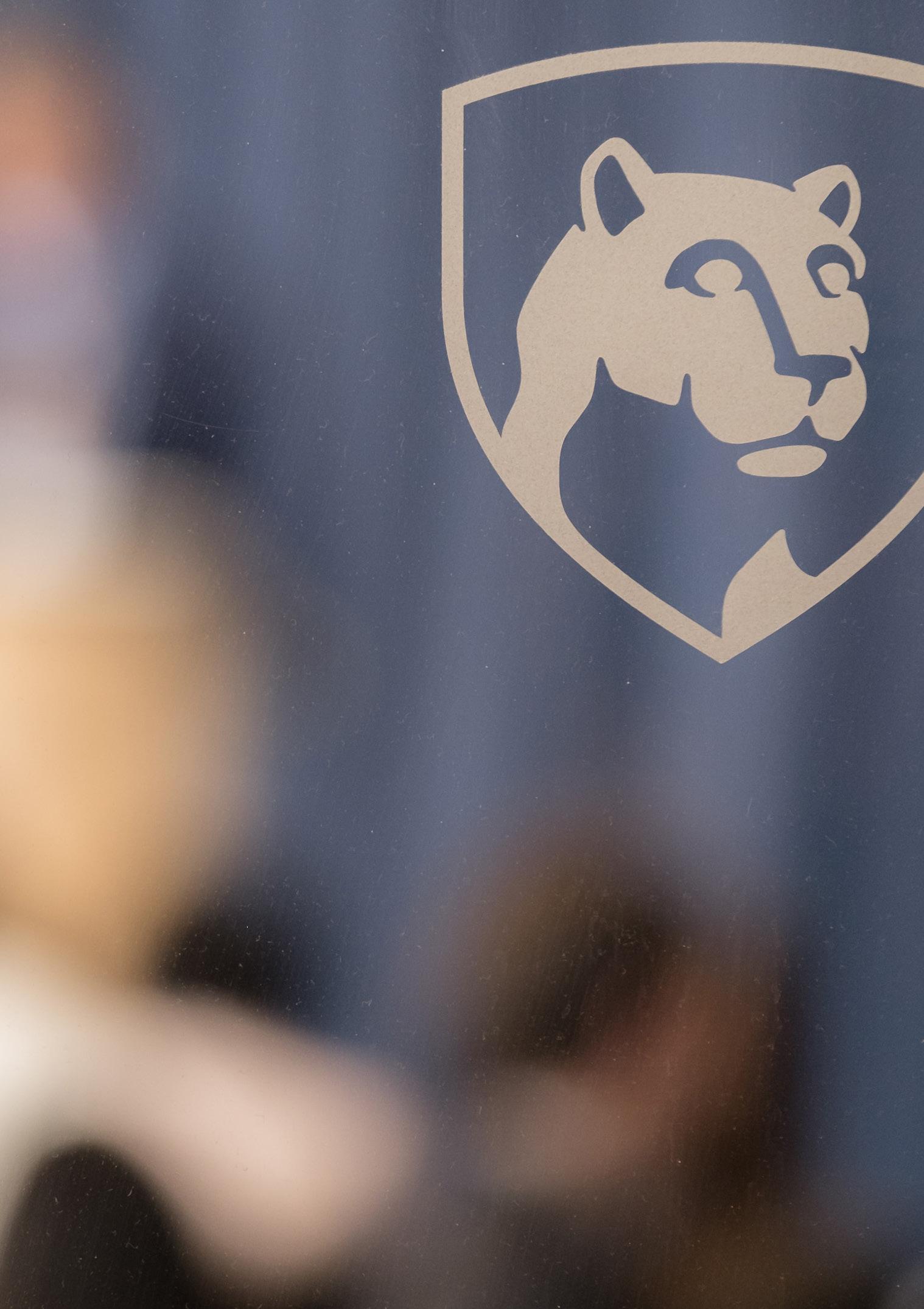
These awards honor and recognize outstanding contributions to international understanding by graduate/undergraduate international students (holding non-immigrant status) enrolled in full-time resident instruction or its equivalent. Winners are chosen in four categories, two of which were announced at the Penn State Global Awards and two of which were announced at the University-wide undergraduate and graduate awards ceremonies in March and April, respectively.
Winners for the Frisbey Student Awards were as follows:
Graduate Award
Olanrewaju Michael Shittu
Undergraduate Award
Daniel Garcia Calao
Winners for the Frisbey Leadership Awards were as follows:
Graduate Award
Zilfa Irakoze
Undergraduate Award
Vanessa Dib
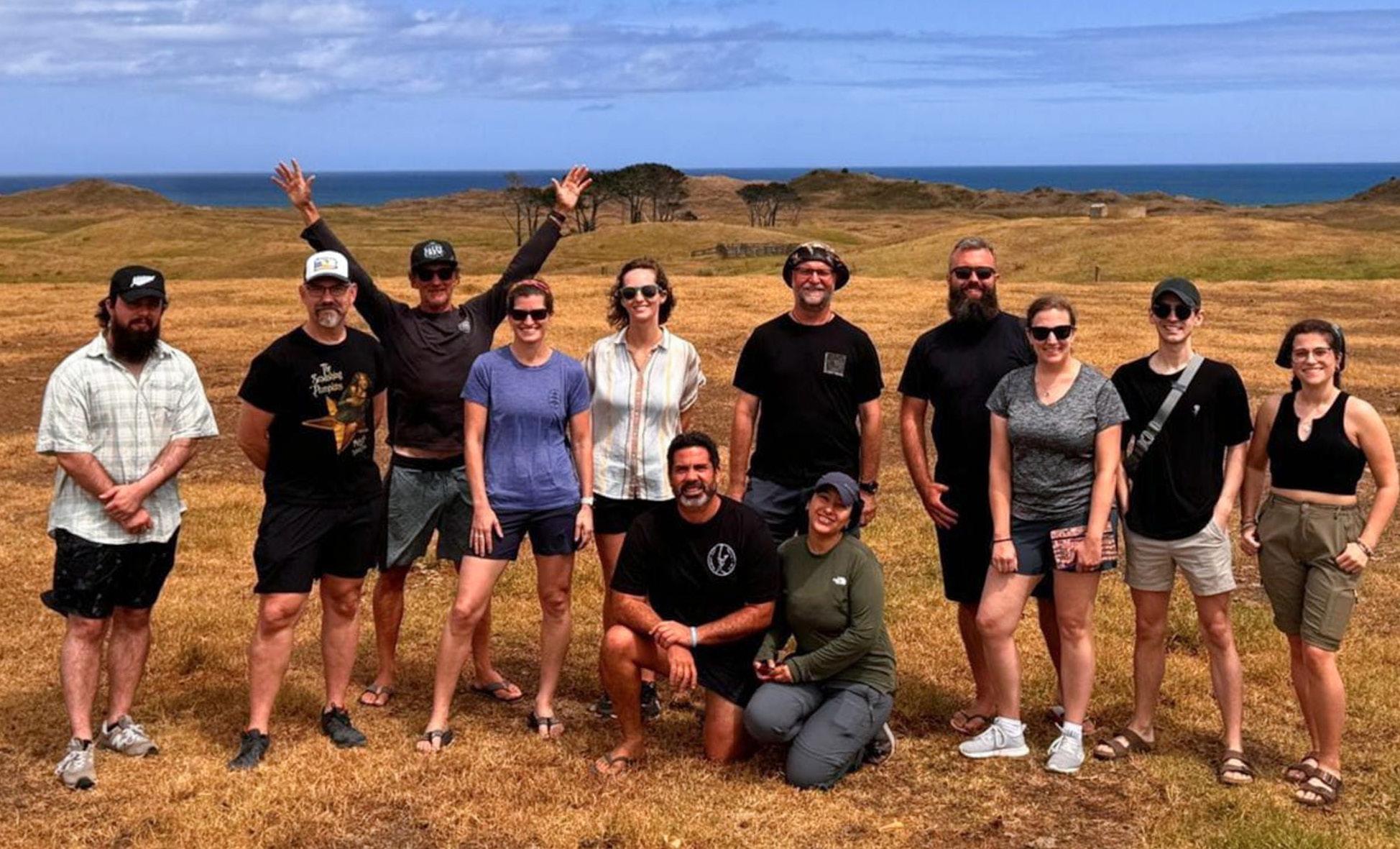
Olivia DiPrinzio, Carolyn Mole and Ben Lindgren each spent two weeks abroad on research projects that are part of a collaboration between Schreyer and Penn State Global. The initiative is designed to connect Scholars with faculty members whose research extends beyond the U.S.’s borders and lines up with the student’s area of interest. Sarah Lyall-Combs is Schreyer’s coordinator of academic and international programs and played a large role in making the partnership possible. Her efforts helped send the first Scholars on research abroad trips over Thanksgiving break in 2023.
“This program is built around a pre-existing structure that pairs a Penn State faculty member with an international faculty member on research at a strategic location overseas,” said Lyall-Combs. “Penn State Global awards seed grant funding to faculty based on submitted proposals. Those grants make the international research projects possible.
“Based on the projects that are funded, the Honors College reaches out to Scholars to invite them to participate through its interest subscription lists,” Lyall-Combs continued. “We provide faculty who work with Scholars on research abroad funds to help with project expenses and we fund the Scholars who participate, as well.”
That funding, along with the faculty whose projects matched their interests, paved the way for DiPrinzio, Mole and Lindgren to travel to Oceania last spring for work on environment-focused research. February saw DiPrinzio trek to New Zealand to collaborate with faculty from the University of Auckland while Mole and Lindgren went to Australia and researched alongside Monash University faculty.
Penn State has strategic partnerships with the University of Auckland and Monash University.
A year after switching majors to the College of Earth and Mineral Sciences, DiPrinzio began a climate, science and education internship with Penn State Sustainability. There she connected with Peter Buck, affiliate faculty and associate director of climate and sustainability education. During their work together, Buck mentioned to DiPrinzio that he had applied for a seed grant to work with faculty at the University of Auckland on climate action plan research.
“I knew my thesis was going to be on climate action plans so I asked if there was any chance I could go,” said DiPrinzio. “He said, ‘I don’t know but we’re going to look.’ Then, Schreyer heard about the seed grant and reached out [to Buck] and said they wanted to send a Scholar.”
For Lindgren and Mole, the trip to Monash University in Melbourne, Australia was centered around understanding research design and methods used for studying effective, sustainable land usage in the U.S. and Australia. Both Scholars are rising thirdyears with Lindgren double majoring in community, environment and development and international politics, and Mole majoring in energy business and finance. Their disciplines allow them to tackle sustainability issues from different angles.
In August of 2023, they were introduced to Youth as Researchers, which is offered by the United Nations Educational, Scientific and Cultural Organization (UNESCO) throughout the world. The program aims to empower students to lead research projects that will enhance their skills and let them investigate issues for which they can drive change.
Lindgren and Mole joined Youth as Researchers in student co-investigator roles where they manage a team of four Penn State students who are researching social science issues related to sustainable land usage in State College.
Their faculty research advisor, Mark Brennan, professor and UNESCO chair on global citizenship education for sustainable peace through youth and community engagement, oversees Youth as Researchers and Penn State’s partnership through the program with Monash University. His collaboration with faculty at Monash helped a Youth as Researchers team take on a project similar to Lindgren’s and Mole’s where the students investigated land usage issues in Australia.
“By far the most impactful lesson that I learned on the trip was the importance of acknowledgment of country,” said Mole. “At every gathering, we took the time to pay respects to the elders, past and present. The acknowledgment of country was so special to experience because the shared respect for Indigenous Australians connects the whole country together and shows how much they value the people who lived on the land before them.”
“The climate justice research and conversation that we took part in on our trip will be incorporated into my thesis, which will deal with the energy industry and climate justice,” she added.
“For me, it was so valuable to see how knowledge and story are interconnected,” said Lindgren. “Combining the academic knowledge of STEM and social science research with community storytelling creates impactful results that go far beyond a publication only viewed by experts. Research, with a proper story, can truly assist an entire community.”
Penn State’s strong partnerships with Monash and Auckland have led to multiple rounds of seed grants, workshops, and site visits between faculty. Including student mobility is also a goal, as shown by student exchange programs with both universities.
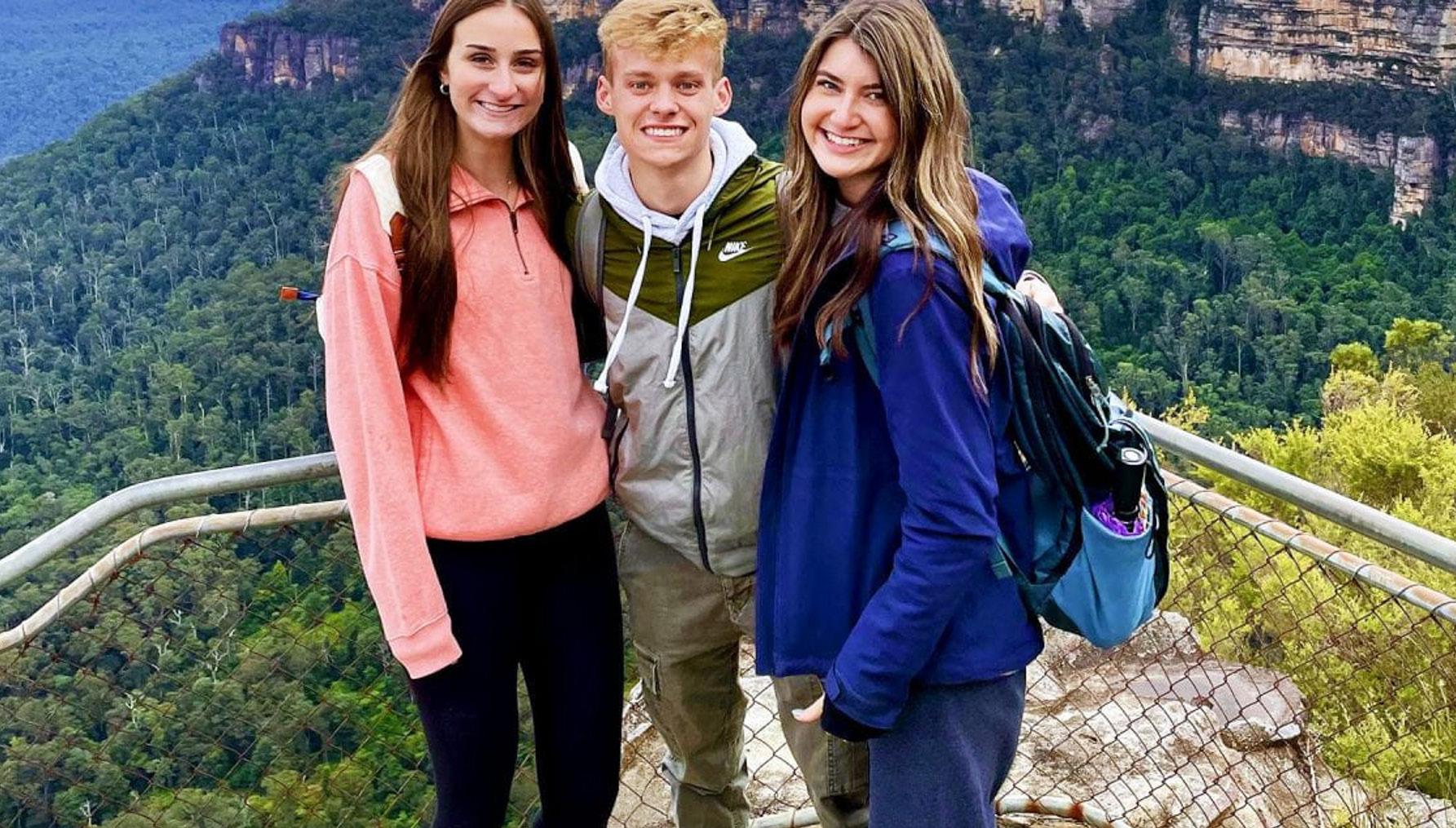
Penn State is one of the premier institutions for sending students abroad, with record numbers of participants in AY 2023-24. The University consistently ranks in the top 20 in the Institute of International Education (IIE)’s Open Doors report. Education Abroad experiences at Penn State include variety in length (ranging from a week over Spring Break to an entire academic year), structure (faculty-led courses or traditional study abroad experiences), region (students have gone on Education Abroad experiences on all seven continents), and area of focus. This year, the focus was on access and sustainability.
Penn State students in WMNST 399: The Quest for Reproductive Justice in South Africa, a faculty-led program, went on numerous field trips to cultural sites and reproductive justice community organizations.
of Women’s,
Susanne M. Klausen, Brill Professor of Women’s, Gender, and Sexuality Studies, led students on a Maymester course that she designed. In partnership with the Council on International Educational Exchange (CIEE), Klausen took 10 students to Cape Town, South Africa. The course, WMNST 399: The Quest for Reproductive Justice in South Africa, examines the history, aims and politics of the struggle for Reproductive Justice in contemporary South Africa.
The program explored the centrality of colonial reproductive violence to the conquest and colonization of the region that became South Africa; the ongoing effects of racialized and gendered colonial reproductive violence in contemporary South Africa; obstacles to attaining sexual and reproductive justice in contemporary South Africa; the emergence and aims of the Reproductive Justice framework; and organized, community struggles underway to attain sexual and reproductive justice.
The program provided classroom and experiential learning opportunities through numerous field trips to public health sites and leading Reproductive Justice community organizations.
“Meeting with the local NGOs and organizations helped foster my educational experience and nurtured my interest in reproductive justice in a way I don’t think would have happened otherwise,” said one participant.
This program will run every other year, with the next one slated for summer 2026.
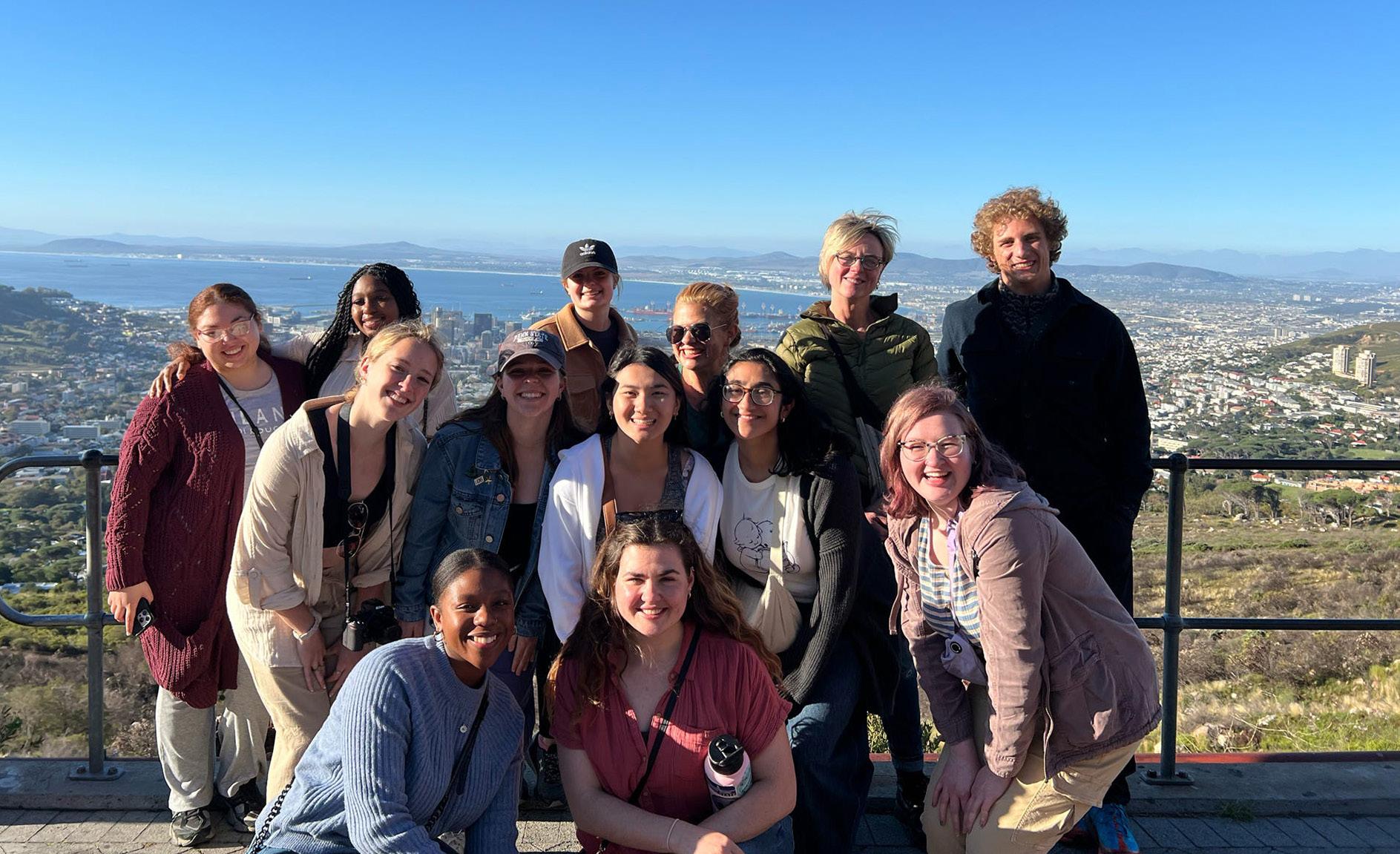
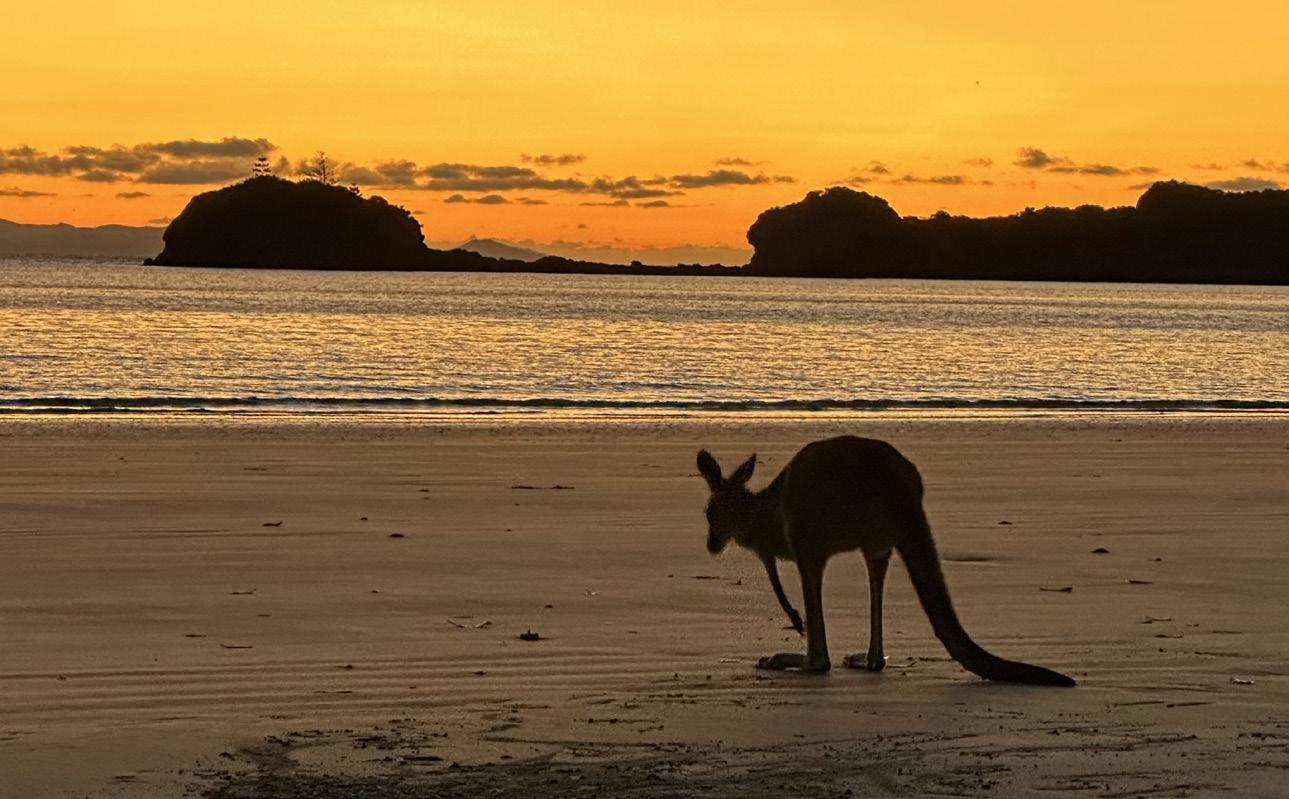

Soleil Savadove Sellnow, Psychology B.S., 2027 is a first-year student from Abington campus who studied abroad in Australia.
How was the experience of studying abroad as a freshman?
because no one else has done it— be the first! Inspire your peers! Do it, your future self will thank you. I promise you won’t regret it, I know I didn’t.
You studied abroad with our partner institution, Monash University, in Australia. Can you describe your experience there?
350+ available programs in 50+ countries on all
2844 students enrolled in 7 continents
Prior to my exchange semester, I had never been out of the country, let alone, away from home for such a long time. Because I attended Abington, I commuted to school. Plus, I was a Freshman during my semester abroad, so this was my first time having a “real” college experience. I genuinely feel like studying abroad as a Freshman, although seemingly intimidating, was the best decision I could have made. It allowed me to interact with my older peers... people who had more experience than I did. It also gave me flexibility in the courses I could take. I focused on mostly Gen Ed’s, which made my experience over there more enjoyable in my opinion. It let me explore academia while also maintaining a balance with my personal life.
What would you say to other commonwealth campus students who might be unsure about study abroad?
I would say: go for it! I was in your position once and I know the unknown can be scary, but once that fear fades away, you will see how amazing your time abroad can be. The Commonwealth campuses have the same resources that University Park does, you just have to be the one to advocate for yourself and find them. Just because it’s not as common to see other students studying abroad through the campuses doesn’t mean it’s impossible. Don’t be afraid to do something just
One of the reasons why I think I felt such a deep connection to Monash University is because of how much it reminded me of Penn State. It was a lively campus, and it almost felt like its own bubble. I felt safe and comfortable! Not once did I feel any homesickness, in fact, I was surprised at how well I did, especially for this trip being my first time out of the country. I was very proud of myself actually. I lived in on-campus housing during my time there, so I was fully integrated with the Australian students. The people there are so friendly, and they included me in everything they did. I truly feel like Monash is my second home. During my education abroad experience, I learned about other cultures, perspectives, and people. I think that was what was most important to me. I applied to study abroad knowing I wanted to learn, not only in an academic setting, but in real life as well. I avidly believe that a lot of the learning we do in life isn’t solely intentional or academic. Although those aspects are equally important, I truly feel that experiences like these (studying abroad) are what shape people in becoming more open minded and educated. The best thing is that the experiences I had abroad will be carried with me throughout my entire life. I can apply them to both academics and life.
At Penn State, we understand that everything has global connections. Therefore, global learning should be woven into the fabric of all academics and learning at the University. Through the efforts of the Global Academic Engagement team, faculty now have resources and incentives to invest in internationalizing their curriculum. Using examples from abroad when teaching key concepts; utilizing cultural texts and resources from countries outside of the United States; and connecting Penn State students with other students around the world are just three examples of what internationalizing curriculum could look like.
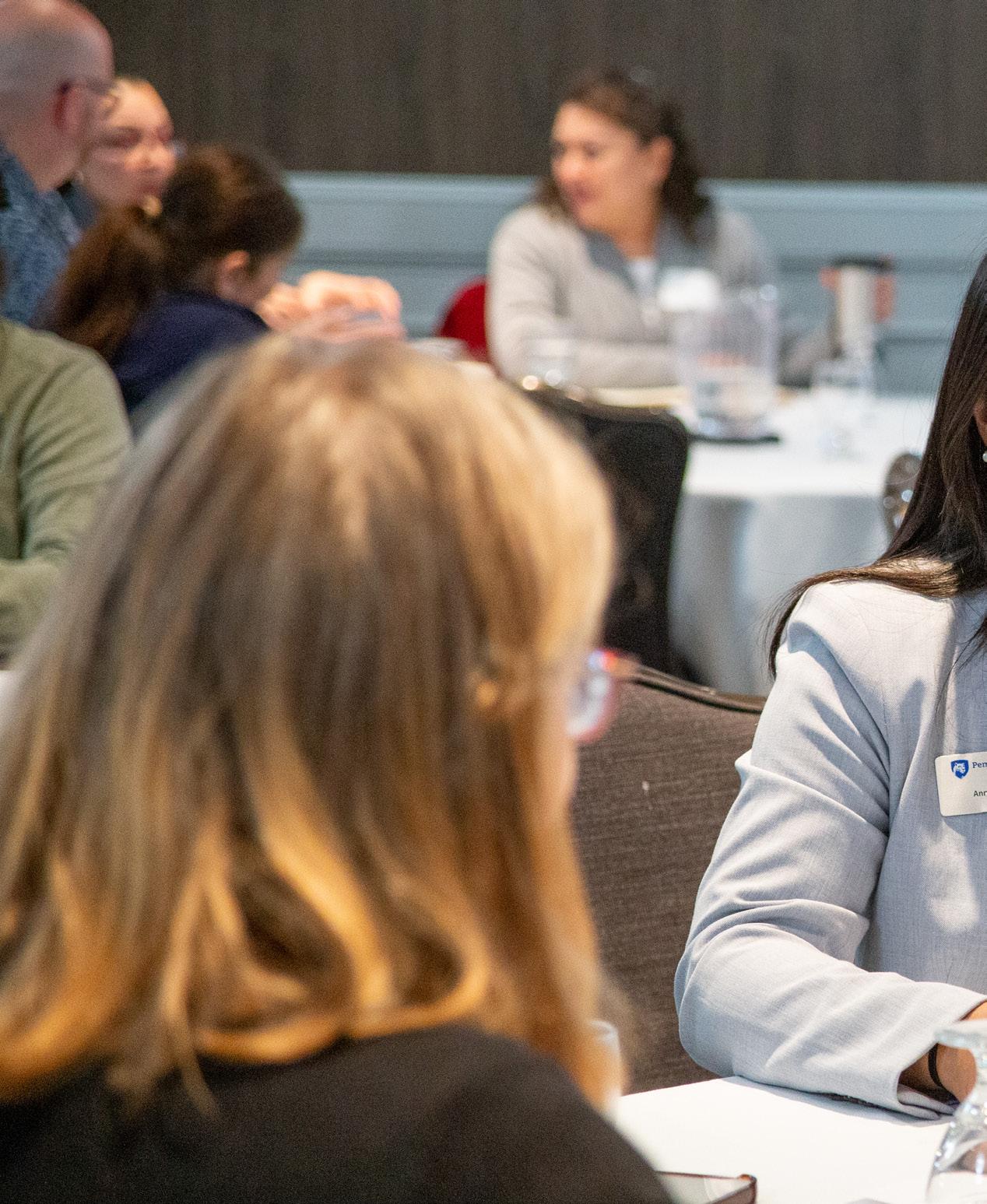
In June, Penn State Global welcomed the second cohort of faculty for our Global Learning Faculty Fellows program. These fellowships aim to provide mentorship to faculty from a range of disciplines to add global dimensions to undergraduate courses across Penn State. The fellowship opens with a 3-day institute and concludes with a faculty showcase at the close of the spring semester. Participants can also earn a Provost Endorsement at the completion of their Fellowship.
The Global Learning Faculty Fellowships program is run in collaboration with Schreyer Institute for Teaching Excellence (SITE) and the English for Professional Purposes Intercultural Center (EPPIC).
Penn State Global is currently developing an online course for faculty who are interested in adding a global dimension to their course, but who may be not be able to participate in the 3-day institute.

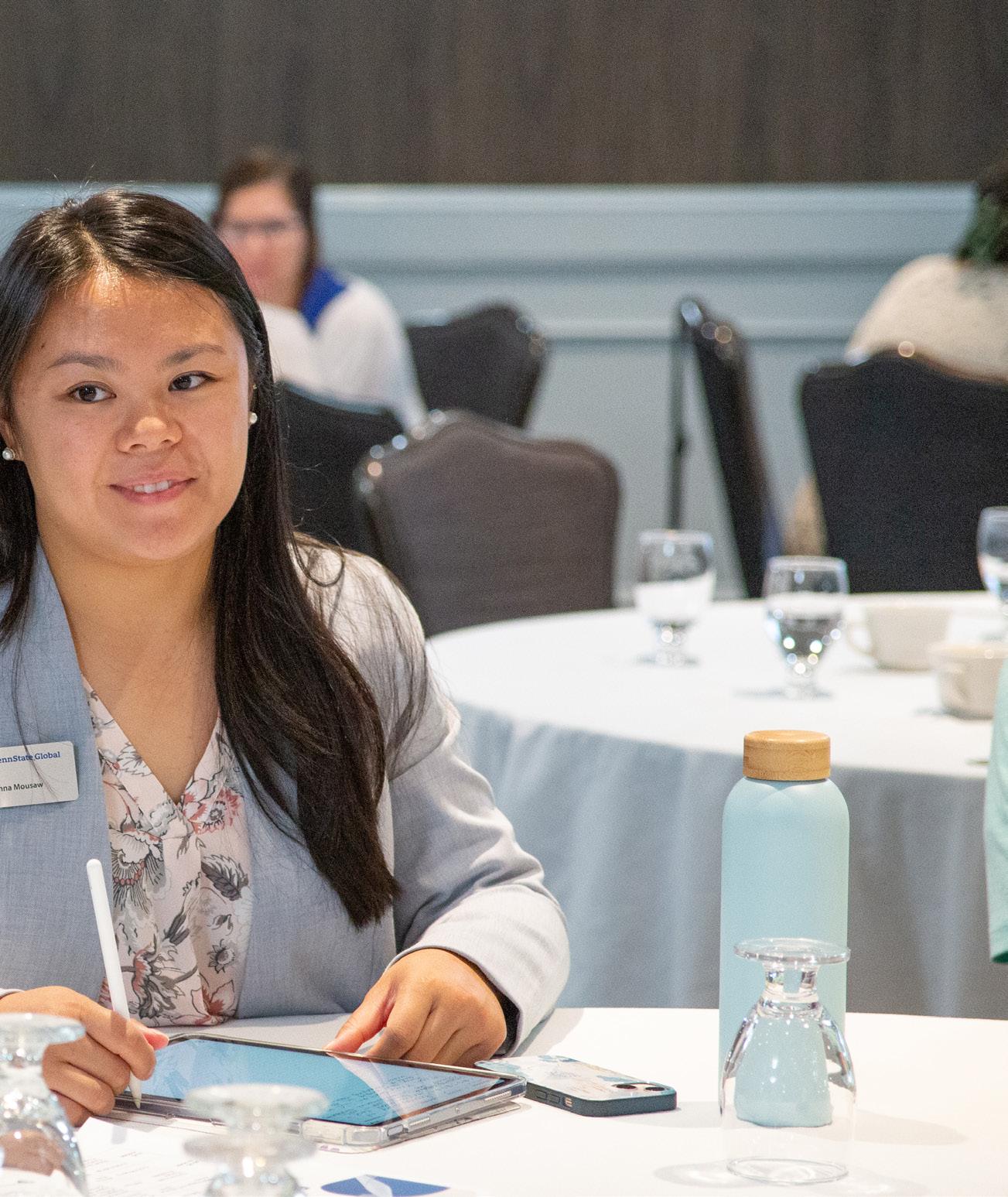
Learn more about our

Global Learning Faculty Fellows Program
Learn how to infuse a global dimension into one of your courses or enhance your course with new global learning activities. Explore creative tools, strategies, and frameworks for designing courses that will prepare your students to live, work, and lead in our globalized world.
Foundations of Experiential Digital Global Engagement (EDGE) Program
Discover the transformative potential of EDGE as you adapt an existing syllabus to include EDGE learning objectives, tasks, and assignments, and create an EDGE action plan. Learn how to design EDGE projects that promote meaningful cross-cultural engagement, collaborative problem solving, and intercultural learning experiences, considering factors such as cultural diversity, technological affordances, and disciplinary relevance.
Penn State’s EDGE (Experiential Digital Global Engagement) program offers a tremendous opportunity for students and faculty alike! What better way to equip our students for the workplace than to provide them with an opportunity (at no additional cost to them!) to develop crucial 21st century skills such as intercultural interaction, project collaboration, distance collaboration, and digital skills. The EDGE program provides our faculty the opportunity to build a collaborative relationship with international faculty, develop engaging learning experiences, and cultural awareness to the classroom.
Penn State is committed to helping students increase their global awareness, global literacy, global competency, intercultural competency, and global citizenship. EDGE projects are embedded into our Penn State courses: our students team with students from around the globe and are tasked with solving a problem, thereby developing and strengthening their global awareness and perspective. Not all students have the financial or personal flexibility to study abroad. That is the strength of our EDGE program.
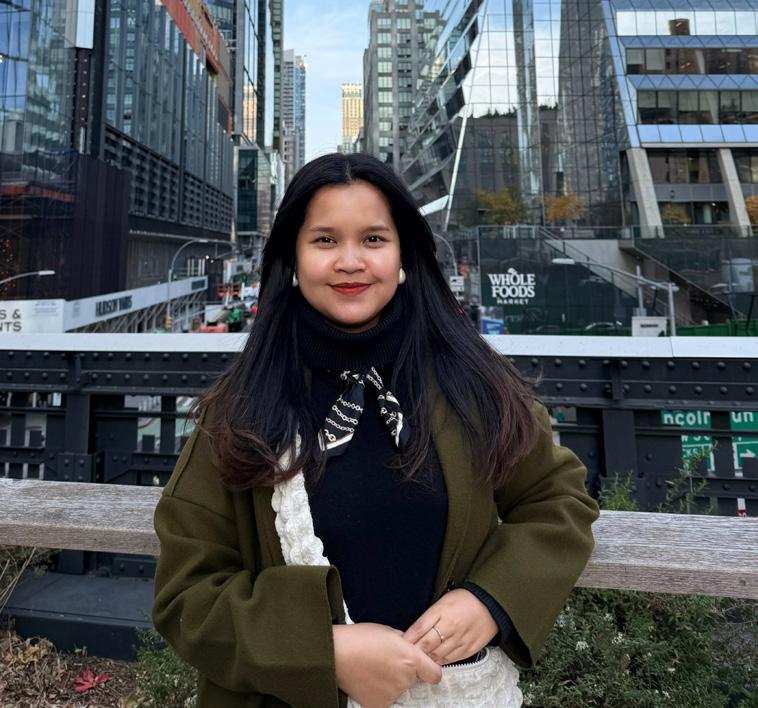
Intan is currently pursuing a Master of Professional Studies in Hospitality Management at Penn State and will be graduating in December 2025. State School of Hospitality Management for recognizing me and my efforts, which gave me the chance to represent Master’s students at this prestigious event.
Can you talk about why you chose to study at Penn State?
I originally applied to another university and had been in touch with a professor there for about five years. When that professor looked over my resume and saw my area of interest, he recommended that I check out the Hospitality Management program at Penn State, saying it was one of the best. So, I did my research and found out that Penn State’s Hospitality program is one of the top-ranked in the U.S. After that, I didn’t hesitate for a second – Penn State was the perfect choice for me!
What is the most important lesson you’ve learned while studying at Penn State?
Penn State is something I’ll always be grateful for. I’ve always worked hard and worked smart, but this time, Penn State made it so much easier for me. It’s not just about opening doors –it’s about opening whole gates! The networking opportunities I’ve had here are something I will always cherish. Being able to learn directly from the amazing professors is like a luxury in the education I’m getting. I’ve made some incredible friends here. They’re not only kind and cool, but they’re also super knowledgeable and supportive.
By the way, I just received a scholarship award from Amazon at the Business Travel News event in New York! All of this is thanks to the Penn
How has your experience been as an international graduate student?
Being an international graduate student at Penn State is honestly such a great experience! Penn State provides us with all the resources we need, so there’s no need to worry too much. Sure, it might feel a little nerve-wracking at first, but as I said before, Penn State makes everything so much easier for us.
There will be tough days, but always remember that you’re stronger than any challenge you face. You’ve made it this far for a reason! When things get overwhelming, try doing some physical activities at the Intramural Building to keep your body and mind healthy. Take things one step at a time when it feels heavy.
What made you decide to become an International Student Welcome leader?
Well, I’m an extrovert and I love meeting people from all kinds of backgrounds. I always felt that by becoming an International Student Welcome leader, I could help new students feel more at ease because we’re here to assist them with their transition. I love the feeling of offering something valuable to someone in a simple but meaningful way.
Plus, it’s a small step for me to experience the U.S. work environment before I plan to take my OPT after graduation. So far, being part of the International Student Welcome team has definitely given me a feel for how the work place operates here in the U.S.
You serve on the executive board of the Indonesian Student Association. Can you talk about the importance of that organization in your experience here?
Before coming here, I had about 6 years of professional experience in my home country, Indonesia. I felt it was important to experience how organizations work in the U.S. I wanted a hands-on experience and share differences I’ve noticed with others, especially people from my country who are just starting their journey here.
Being part of the executive board of the Indonesian Student Association has shown me a lot of differences compared to what I’ve experienced in Indonesia. This has opened me up to new perspectives and presented challenges I never expected. It’s pushed me more than before, and now I understand better how organizations operate here in the U.S. My creative thinking and problem-solving skills have improved, too.
What is one (1) piece of advice you would give an incoming international graduate student?
Make sure you’re enjoying the journey! Prioritize your happiness – when you’re happy, everything around you becomes easier and more enjoyable. Transitioning will be so much smoother and less overwhelming. You’ve already come this far, which is amazing! So keep moving forward and create new milestones along the way. Congrats, and I’ll be waiting for you in Happy Valley! Xoxo
Deika is currently studying Biochemistry and Molecular Biology at Penn State Berks, and is expected to graduate in December 2025.
Can you talk about why you chose to study at Penn State?
I chose to study at Penn State because it offered a major I was interested in, and it was ranked well in research. The proximity of campus to my family in the US was also a contributing factor.
What is the most important lesson you’ve learned while studying at Penn State?
In the words of one of my favorite persons, James McCarthy, “Life is a contact sport.” This is one of the best lessons I’ve learned during my time here. Every person you meet shapes or impacts your life is some form, even through the smallest of interactions. It taught me the value of every smile I received and gave.
You study at Penn State Berks as an international student. How has your experience been studying at a Commonwealth Campus?
I have had the best college experience I believe I could have ever had here at Berks. After getting more involved on campus with mentoring, research and other activities, I have a gained a phenomenal network of people that makes Berks feel like home. Commonwealth Campuses are typically smaller, and this allows me to form more intimate relationships with those around me. It’s one of the things I love most about Penn State Berks, the community.
Why did you decide to become a mentor for other international students?
I decided to become an international student mentor to help new incoming students integrate as best as possible to life at Penn State. I wanted to contribute to creating an environment where students felt comfortable enough to be and express themselves.
Most importantly, I wanted students to
have a better experience than I had. In my first semester at Penn State Berks, I felt quite isolated. Everything was new, the weather, the people, the place, the culture. I came in spring and so I missed out on International Student Welcome and Welcome Week. It made it harder for me to socialize as everyone was already settled in. I also was assigned my mentor a bit later on in the semester and so I had to figure most things out on my own. So, as a mentor my aim is to ensure my mentees know that they are not alone.
You recently presented at the Global Sustainable Action conference. Can you talk a little bit about your presentation and why you decided to do it?
I am a member of the Emerging Contaminants-Microplastics Research Team led by Dr. T. Mysliwiec and Dr. J. Felker. At the conference, my colleague, Hailey Zavecz, and I did a presentation focusing on the dangers of microplastics in our environment and its impact on humans and the ecosystem. We also shared our research on the quantity of microplastics found in Blue Marsh Lake and the presence of antibiotic resistant bacteria found on these plastics.
I decided to do this presentation as I had attended the Global Sustainability Conference last year and thought it was a great opportunity to raise awareness on microplastics and share how sustainable measures can help to lessen the presence of plastics in our environment.
What is one piece of advice you would give an incoming international graduate student?
Engage, engage, engage! Join clubs, go to events, network and socialize. Memories are made outside your dorm.
5,202 Undergraduate Graduate
3,761 Optical Practical Training (OPT)
1,350+
Total International Student Composite
10,920
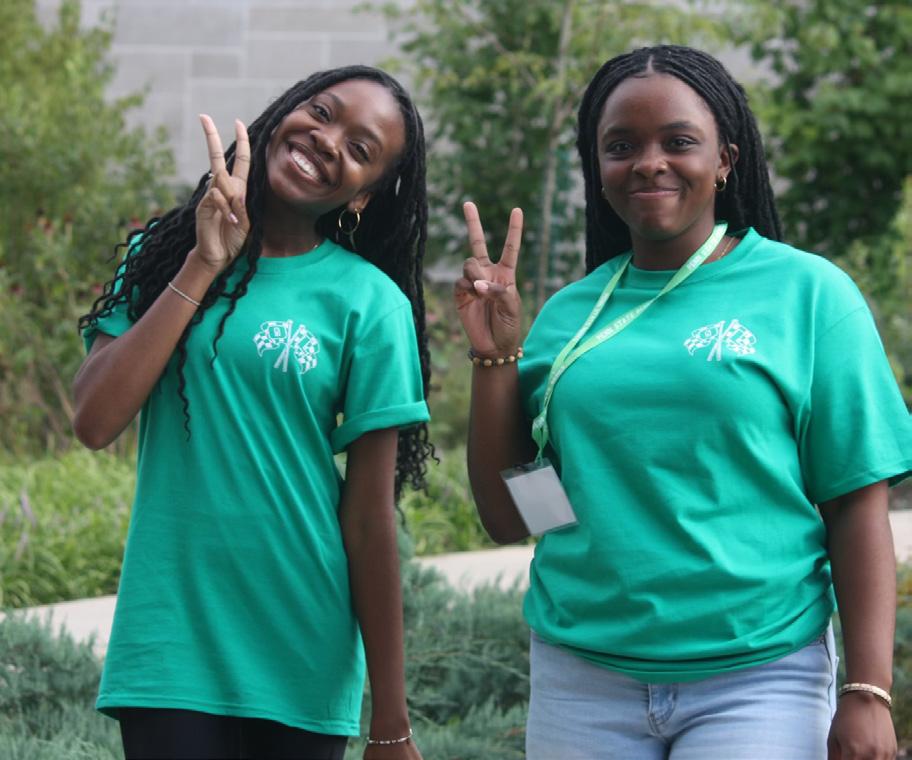
Credit: Deika Ferron(left) participating in Welcome Weekend as an Orientation Leader
As part of International Education Month, Penn State Global hosted the Global Sustainable Action: It Starts with Us conference on November 16th and 17th. The conference was a day of workshops, presentations, and site visits around the university’s sustainability efforts - students, staff, and faculty. This followed a University-wide “day of service” on October 12th, which included more than 80 students from five campuses — Abington, Berks, Brandywine, Great Valley and University Park — participating in four service experiences, including planting trees, invasive species removal, service work at the Dr. Keiko Mawa Ross Student Farm, and sustainable landscaping.
Student-led sessions included “How to Make Penn State Campuses More Sustainable,” “Connections Between Culturally-Responsive Teaching and Sustainability,” presentations by the Schuylkill Beekeeping Club, and a “Climate Change Mosh Pit,” among other activities and tables.
Third year hosting the Global Sustainable Action: It Starts with Us Conference with Penn State Sustainability
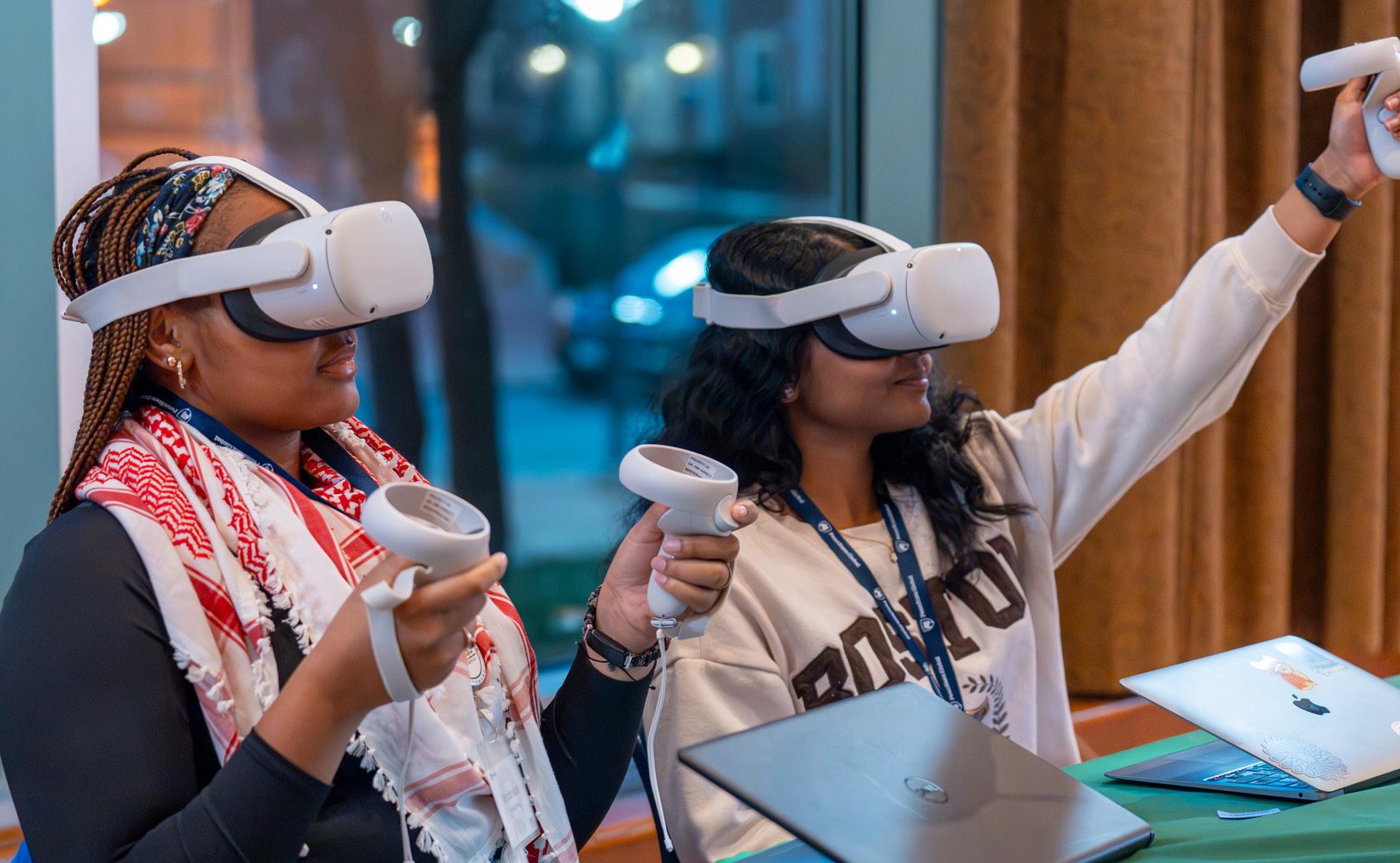
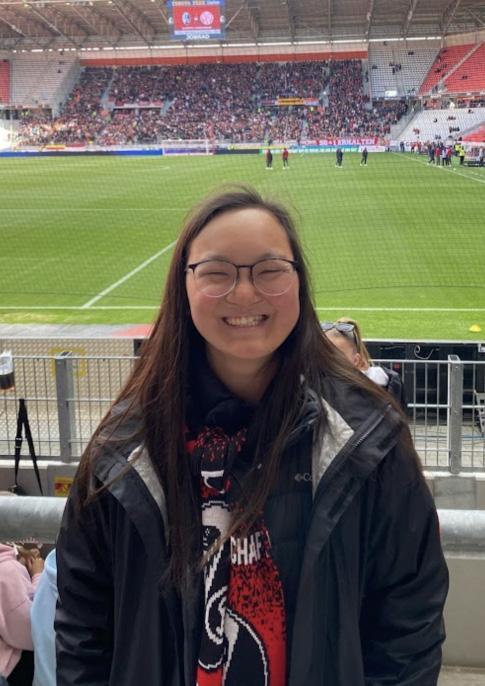
The Penn State Global Sustainability Scholars program is a competitive scholarship program managed by Penn State Global in partnership with Penn State Sustainability. Each fall, a cohort of 10-15 students is selected who are eager to use their education abroad experience in the coming year to develop the skills and knowledge they need to advance the United Nations Sustainable Development Goals (UN SDGs). These students commit to meaningful engagement with the sustainability community at Penn State before departure, building global sustainability knowledge abroad, using these skills to advance the UN SDGs upon return, and sharing their experiences back to the Penn State community.
Hannah Kline is a fourth-year Schreyer Scholar at Penn State University Park pursing a double major in biochemistry and German.
Upon arrival at Freiburg, Germany, I was immediately greeted and exposed to the sustainable actions that the city is taking. Freiburg is well-known in Germany for being the “Green City.” Freiburg aims to achieve 100% renewable energy by 2035 and carbon neutrality by 2050.
In particular, one of the residential districts, “Vauban,” is known as one of the most sustainable city districts in the world. This innovative neighborhood, developed on the site of a former French military base, has become renowned worldwide for its forward-thinking approach to urban planning and environmental design.
One of Vauban’s key pillars of sustainability lies in its commitment to reducing carbon emissions and promoting eco-friendly transportation. The neighborhood prioritizes pedestrian and cyclist-friendly pathways, with car-free zones and limited parking spaces to encourage residents to rely on more sustainable modes of transportation. Public transportation infrastructure is robust, with efficient tram services connecting Vauban to the city center and surrounding areas, further reducing the need for private vehicles.
The neighborhood boasts a high concentration of energy-efficient buildings equipped with solar panels, green roofs, and other passive design features to reduce energy consumption and reliance on fossil fuels. Additionally, Vauban’s district heating system utilizes biomass and other renewable resources, providing residents with sustainable heating solutions while reducing greenhouse gas emissions.
The weekend of April 19-21 was a “Stay Local” weekend, so instead of traveling with friends to Switzerland, I pledged to stay in Freiburg. I looked at events happening in Freiburg and decided to go. I spent four hours on Saturday taking an open-introduction dance workshop featuring West Coast swing, salsa, bachata, and tango. I danced occasionally back in the USA with Social Dance Club, and this was a great experience to meet people.
On Sunday night, I went to the Europa Park-Stadion to catch a local soccer match featuring SC Freiburg against FSV Mainz ‘05, the city’s beloved football club. The stadium excitedly buzzed as fans clad in the team’s colors filled the stands, chanting and cheering in unison. Amidst the sea of cheering spectators, I felt a sense of camaraderie and shared passion for the beautiful game. It was an insane experience comparable to Penn State Football energy, even though fewer people were there.
Written material provided by Allison S. Duncan
The Global Careers Institute (GCI) is a professional development program designed to assist Penn State’s international and domestic undergraduate and graduate students prepare for success in the global marketplace. Featured speakers include prominent Penn State alumni from an array of businesses and industries around the world. Penn State Global, in partnership with multiple units (including Career Services and Penn State Great Valley), hosted two Global Careers Institutes in 2024, marking the fourth and fifth iterations of the institute, respectively.
In 2024, GCI hosted three virtual sessions in partnership with alumni from diverse employment backgrounds worldwide. These sessions were attended by students and staff from various Penn State commonwealth campuses, focusing on opportunities to pursue graduate school outside of the USA, networking for global careers, and global entrepreneurship careers. Alongside virtual events, GCI hosted the Annual GCI 2024 Conference on March 22 and 23, 2024, at University Park, attended by 150 undergraduate students. The theme for GCI 2024 was ‘resilience’. The networking conference offered attendees the opportunity to engage with 19 alumni speakers from around the world.
A GCI for graduate students was held at the Great Valley campus Sept. 27 and 28, co-hosted by Penn State Global and Penn State Great Valley. This professional development event offered presentations and networking opportunities to help students prepare for career success in the global marketplace.
Approximately 115 graduate students from multiple campuses attended the event and interacted with speakers, alumni, faculty and staff. Featured speakers included prominent Penn State alumni from a range of industries and countries.
One highlight of the conference was the keynote address from Nana Yaw Essuman, vice president for data engineering at FanDuel, who earned his master of software engineering at Penn State Great Valley and shared about the positive impact his education had on his life and career. He encouraged students to seek diverse experiences to broaden their understanding of other cultures and perspectives and to inspire new ideas.

“As a mid-career professional, I found it truly inspiring to hear from the speakers about how career paths are not always linear and can take unexpected twists and turns, building strengths along the journey, and ultimately leading to success. The advice provided by the speakers was relatable, down-to-earth, and logical. It not only helped me from a strategic standpoint but also relieved a lot of stress, motivated me and uplifted my spirits to learn that such esteemed speakers had non-traditional career paths, much like the one I am on. Additionally, I was fortunate to make many connections with other Penn State graduate students and alumni, which will significantly impact my networking community.” represented at the Spring 2024 GCI in University Park. This includes both students and Penn State Alumni speakers who have traveled all over the world to lead sessions for students on global careers.
Countries
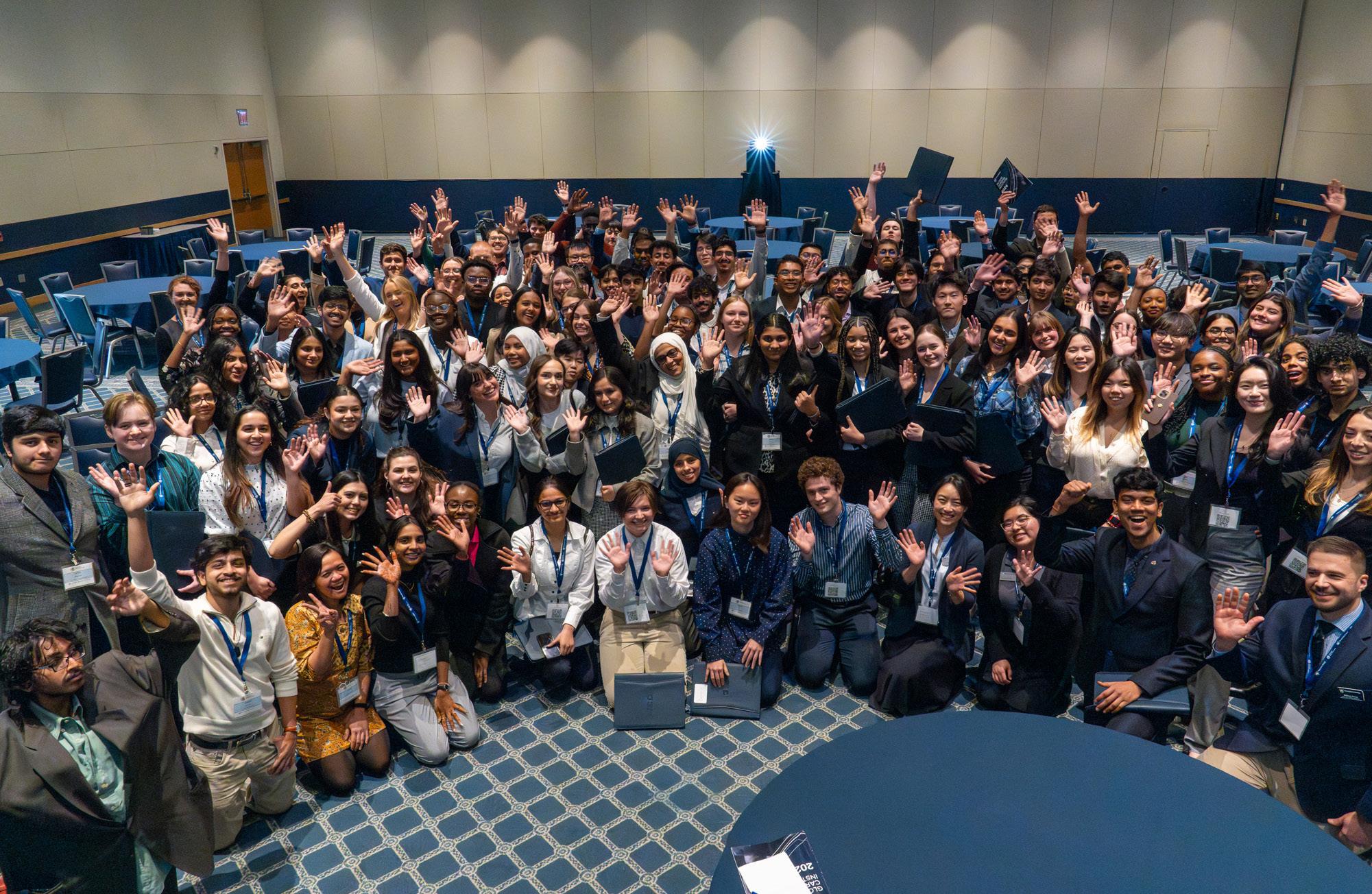

Twelve commonwealth campuses were represented at the Spring 2024 GCI at University park.
Lila “Wan-Chen” Chung, Penn State class of 2016, an international student to a dynamic leader in sustainable development is now the chief executive officer of the Taiwan Sustainability Hub (TSH), leading a team of researchers to advance sustainable initiatives for communities.
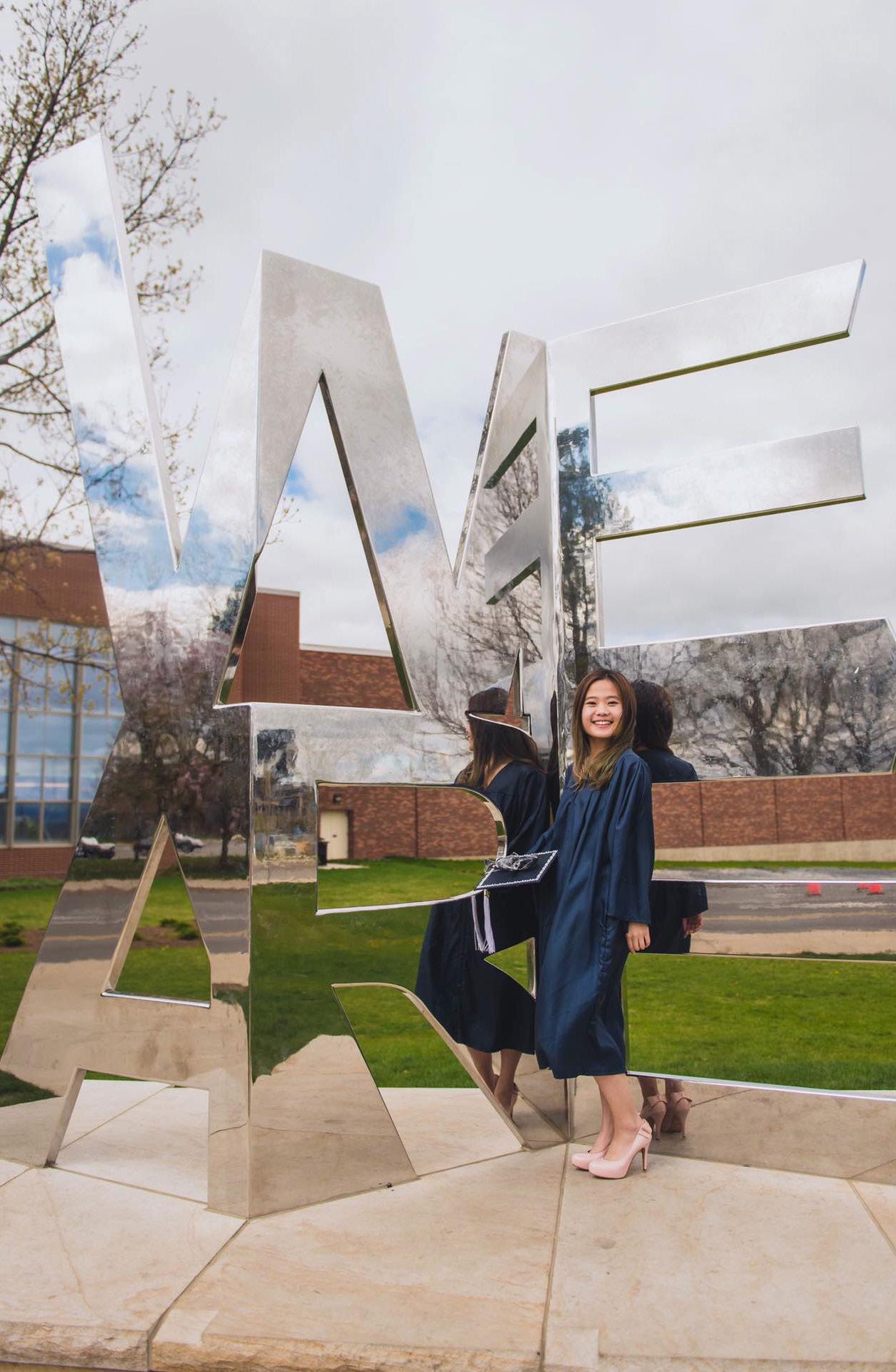

Sustainability was not always Chung’s greatest interest, she said; in fact, drawing has been her passion since she was five, though, she said, she was discouraged from pursuing a career in art due to her family’s cultural beliefs that it might not lead to stable employment. She came to the United States to finish her high school education before enrolling at Penn State and majoring in international relations.
It was after her sophomore year that she felt lost, said Chung, questioning her path. She thought, “What should I do? [There were] a lot of international students there, and they were in business school, doing accounting, then went to big firms after graduating. What am I going to do with international relations?”
Chung tried some business classes but quickly realized that business was not going to work for her, either. Feeling uncertain about her future, she said, she sought advice from a career adviser, who suggested she try some classes in social entrepreneurship.
Despite the uncertainty in shaping her future, Chung said she was persistent in making the most of her time at Penn State. One year before her graduation, during the summer of 2015, she had an opportunity to visit Zambia with some students, where they interviewed locals on their sustainability efforts and built greenhouses. She said it was an eye-opening experience as she got to experience living in a village without electricity and mobile service.
“I’ve never been to such a rural area. We walked miles and miles to talk to locals, trying to learn about what they were growing. The resources were very limited,” she recalled.
The Zambia trip was also a reflective time for Chung, she said.
“I started thinking about the future,” she said. “What I want to do, what type of work I should pursue after the trip.”
Indeed, she said, she had a clearer mind as she was determined to finish her degree at Penn State. She graduated in 2016 with a double major — international relations and African studies — and a minor in social entrepreneurship.
Earning a bachelor’s degree was not enough for Chung, however, she said. She decided to pursue her master’s degree in international relations and economics at Johns Hopkins University, which led her to some internship positions at non-governmental organizations (NGOs), including the World Bank.
After graduating with her master’s in 2018, Chung returned to Taiwan with her husband. After a brief stint in a think-tank organization, she collaborated with her former colleague, who is now her current supervisor, to establish a sustainability-focused organization in Taiwan.
2018 Graduate from the College of Agricultural Sciences. Majored in Environmental Economics and Policy (Community, Environment and Development). Currently working as Co-Founder and President at Footsteps Bangladesh, Consultant at Asian Development Bank
Since graduating from Penn State, you’ve done incredible work with Footsteps. Can you talk about what inspired you to start doing the work of the organization and what continues to keep you passionate about empowering marginalized communities through infrastructure, entrepreneurship, and more?
Hailing from a country like Bangladesh, you are used to witnessing several social challenges around you. Your reaction to it is similar to the flight or fight response. Some people chose to move away, but I chose the fight option, where I get to tackle these multiple social challenges experienced by communities around me. When I was in high school, I decided to create Footsteps as a mean for young people to let their creativity loose in designing social programs to address extreme poverty challenges across Bangladesh. As of today, we have empowered over 700,000 people across Bangladesh in overcoming extreme poverty. In my 11 years journey with Footsteps, it’s the memories of our impact on ground which motivates me to keep continuing this exciting yet challenging journey, whether it be ensuring safe water access for a child in school, rushing to rescue and relief operations in flooded communities, improve public health infrastructure in the last mile, or create an income source for someone underprivileged who can stand on their own feet in overcoming their day to day hardships. Creating these stories of empowerment and resilience is what keeps me going at the end of the day.
How did your Penn State education influence your view of the world through social justice and entrepreneurship?
The reason why I chose to come to Penn State was to learn how a developed society functioned, so that I could use the knowledge and experience once I went back home after graduation. That was always the plan. The Penn State experience was crucial in my understanding of how society functioned, and the skills I learned have helped me tremendously not only in my own personal capacity of designing social programs to address extreme poverty challenges, but also enhanced my vision of the change I wanted to create in Bangladesh, with a long lasting impact.
Bangladesh has recently gone through some political upheaval. What gives you hope for the future of the country?
After 15 years of being under an autocratic rule, the youth of Bangladesh stepped up to overthrow a government which took advantage of us in every way possible, paving the way for us to hope and dream again of building a better Bangladesh. These young people give me hope, not only because they were extremely brave in stepping up for the dignity of right of our people, but also because how determined they are in building a brighter future for 180 million people of this country. These young people are also the lifeblood of our organization, and Footsteps will move forward with both ambition and determination in playing its part in making the dreams of millions of young people in Bangladesh come true.
You have recently been selected for an outstanding alumni award from the Penn State Alumni Association. What does it mean to you to be recognized by your alma mater in this way?
I am both humbled and grateful for this incredible recognition. If I look back 10 years ago, I had to make an incredibly important decision to choose between UC Berkeley and Penn State for my undergraduate education. Choosing Penn State was and will be one of the best decisions I’ve taken in life, because this institution and its people have given me so much support not only when I was in college but even after graduation as well over the years. Given how the national animal of Bangladesh is a Bengal Tiger, I felt like a tiger cub being raised in a lion’s den during my college years. This recognition means everything to me, for the eternal love I have for this institution and its people and makes me proud of being a Bengal tiger in spirit raised by the incredible Nittany Lions.
What do you view as the next step in your adventure?
With the Sustainable Development Goals deadline set in 2030, we at Footsteps are setting up an ambitious plan to help 10 million people in Bangladesh graduate from extreme poverty level through ensuring access to basic rights, creating safety nets from disasters, and generating income and employment for people in marginalized and vulnerable communities. As the world’s first next generation organization, we also want to set Footsteps as a global example in approaching the challenges of extreme poverty, where local innovation, creativity and inclusion takes priority. In regard to my own personal ambition, I do hope that my work leads me towards being enlisted on Penn State’s notable Alumni List when you search on google in the next few years!
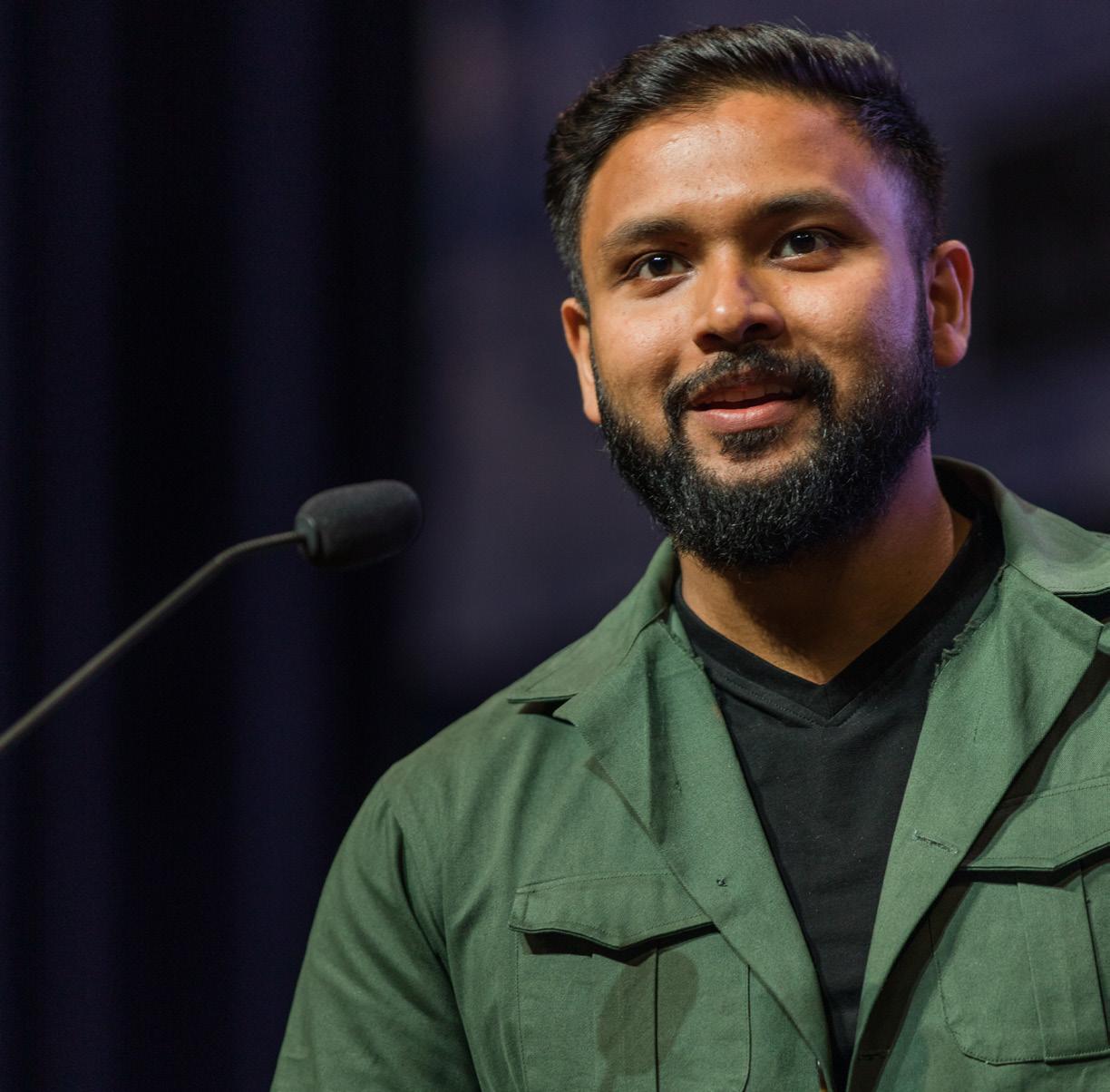
Fernando and Fabiana De Almeida are donors of the Global Emergency Fund and Penn State Parents. The Global Emergency fund supports international students cover education costs when unprecedented events impact their lives.
What inspired your son to choose Penn State for study? (And: what is he studying?)
My son is currently studying architecture. One of the core reasons for his eagerness to study at Penn State was his sentiment that it is a school that fosters a diverse community. It has an emphasis on providing various resources, clubs, and opportunities for all students, keeping the commitment with high level academic rigor. Whether it is an in state student or someone with a completely different background, Penn State will welcome all students.
What role does philanthropy play in your lives?
The role of philanthropy has been growing in my life as I reflect about how we can impact the life of people that we never met.
Why do you think it is important?
Our lives are shaped by the influence of others, people close to us, but also people who we never met. Be able to give back to people and organizations must be part of our desire and practices. This makes us reflect on how much we have and how our generosity can impact others.
032.
You donated to our Global Emergency Fund, bringing it to activation level. Why was supporting this particular fund important to you?
While living in Switzerland, we had the chance to meet international students going to High School programs in the international school my kids attended. These were students coming from remote locations around world. They were extremely intelligent and hard workers. They just needed support to flourish as students.
The typical international student in the better universities, such as PSU, are those who have financial support from family and parents, but this is not the totality of international students. There many who come from very difficult financial environments, and they must be dedicated, persistent and harder workers to overcome all challenges in their original countries and have the courage to move to another country. What great opportunity to support individuals with such courage, persistence, and determination. They inspired us and we want to support them.
When I learned that PSU faced issues supporting students coming with unstable government support programs and some of them could lost the opportunity to complete their degrees for missing financial support, I remembered when I was at college and how much supported I needed to finish my graduation. I see myself in these students and wanted to help them.
Your donation supports global engagement at the University. What would you say to others who might want to support the University’s global mission?
We now live in a global connected world; education has the power to transform lives, communities, and our society. This starts with the develop of individuals. Think about an international student who can graduate in a top university as PSU and can go back to their original countries or even support American development. That perspective should motivate everyone. I also could see during my career in four different countries that great citizens and leaders can come from any place in the world.
What is your favorite memory of your time as a Penn State parent?
Walk through the Architecture studio where my son spends multiple hours working in his projects.
Anything else you would like to add that has not been covered by the above questions?
There are two aspects which we seek every time that we decide to do a contribution: The cause and the institution. Education is also something that brings my attention. PSU is a serious well managed and responsible institution which we know will apply the funds in the best way.
Each year, nearly 10,000 students from more than 140 countries call a Penn State campus their home away from home. Like their fellow students, they attend classes, join student organizations, engage in campus activities and enrich the University’s academic community.
However, unlike their U.S.-based counterparts, international students are not eligible for federal and state assistance, and there are only limited scholarships to assist when unpredictable global events impact their lives. Generally, these students do not have access to additional support if resources from their home country are no longer available due to political or natural disasters.
“At Penn State Global, we are committed to the success of our international students—not just academically, but in every aspect of their journey,” said Jody Pritt, assistant vice provost for International Student and Scholar Advising. “The Global Emergency Fund is a testament to that commitment, ensuring that unexpected financial hardship does not stand between a student and academic endeavors at Penn State. We believe that no student should have to choose between their education and financial strain, and this fund helps provide critical support to help keep students on their path to success.”
Now, more than ever, it is crucial to find a way to support these bright minds. Through gifts to the Global Emergency Fund, you can help international students cover costs like tuition, fees, travel, insurance, housing, and other living expenses in times of crisis. Wherever they hail from, students sometimes need a hand when the going gets tough. And with gifts to the Global Emergency Fund, you can help our Penn Staters who are furthest from home while making a powerful statement about the strength of our global community.
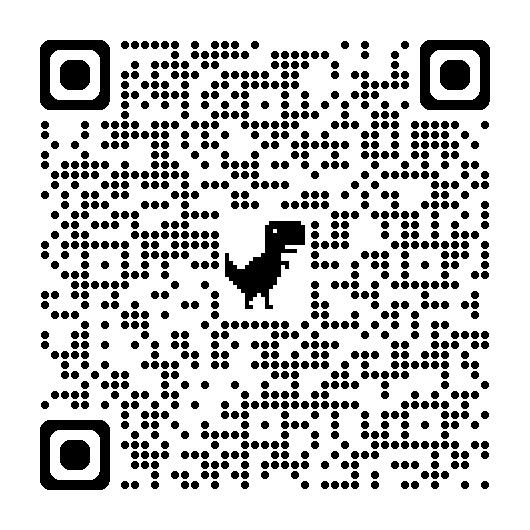

Studying abroad is an opportunity for students to develop academically, personally, and professionally. Expanding their global perspectives through immersive international experiences is a key goal. Dagobert de Levie provided global experiences to students beginning in the 1960s as the founder and first director of Education Abroad at Penn State. This fund, created by his son and Penn State Board of Trustees member Alvin de Levie, seeks to continue Dagobert’s legacy of global experiences for students.
“Engaging in cross-cultural experiences and learning about various perspectives through immersive education abroad programs not only provide Penn Staters with a well-rounded and global education but also shapes them into well-rounded people,” said Kate Manni, Director of Education Abroad in Penn State Global.
While almost 3,000 students across the University typically participate in a study abroad experience each year, many more miss out. Through the support of this fund, an increasing number of students can travel to parts of the world that they never thought they’d see — experiences that are often transformational for their future careers and lives as global citizens.
“Penn State’s Education Abroad Program seeks to provide transformative opportunities.”
Kate Manni, Director of Education Abroad

